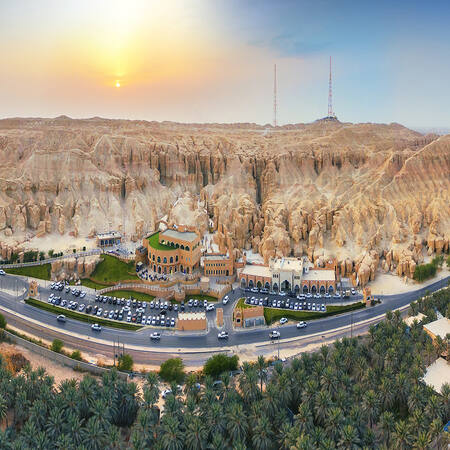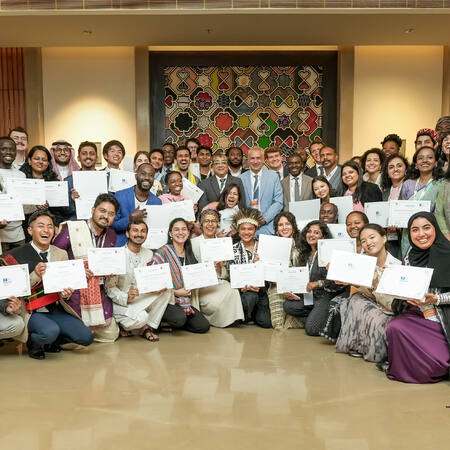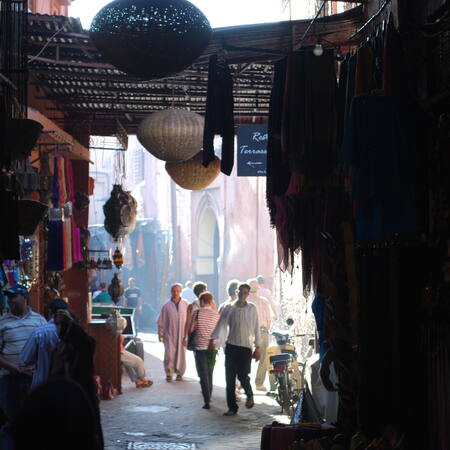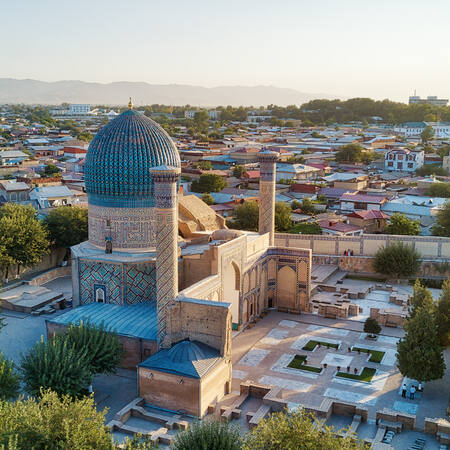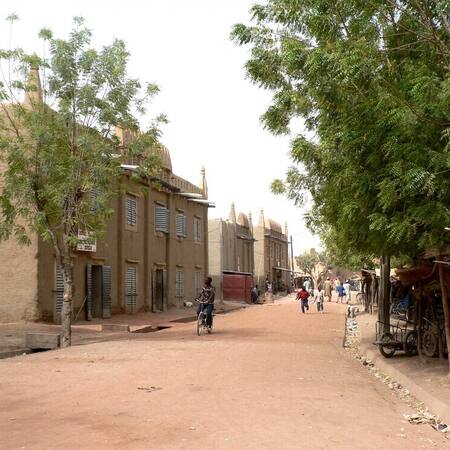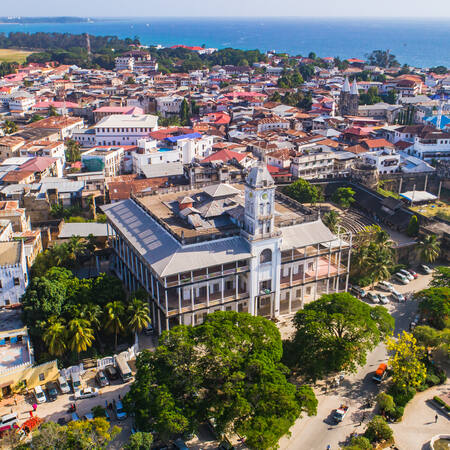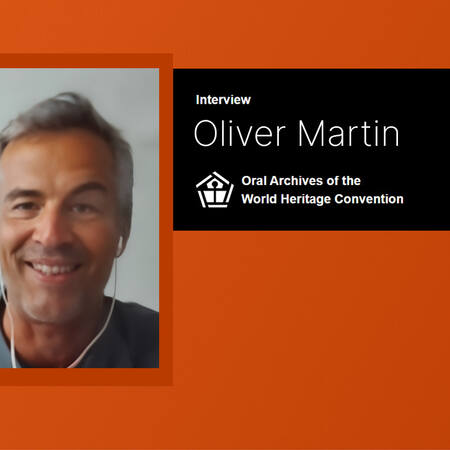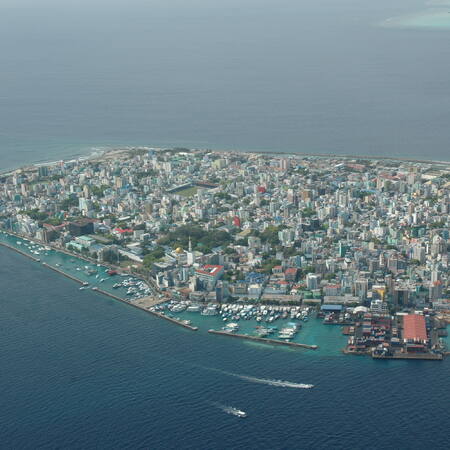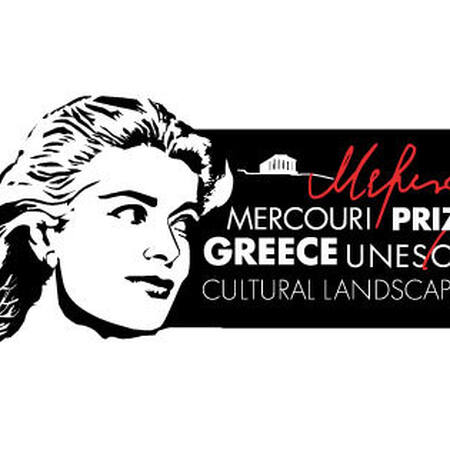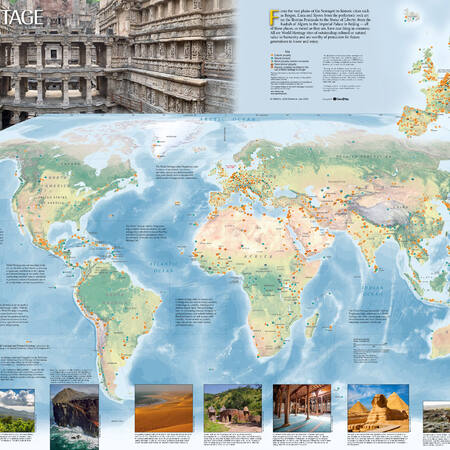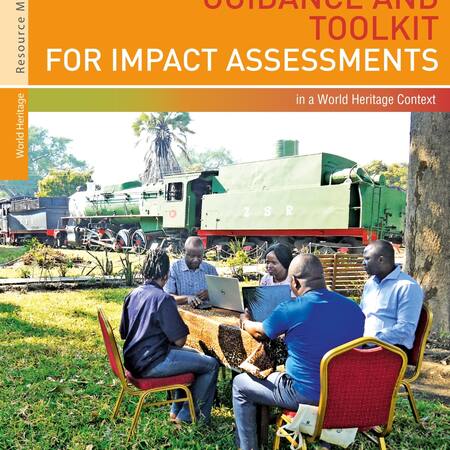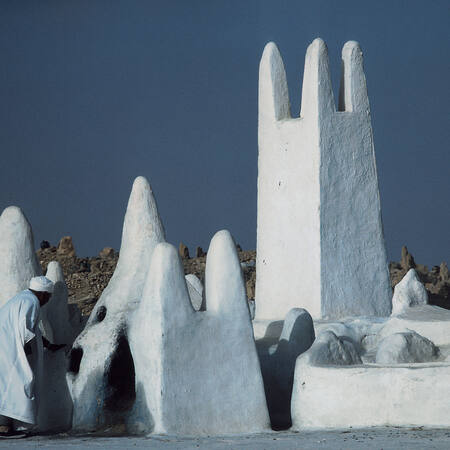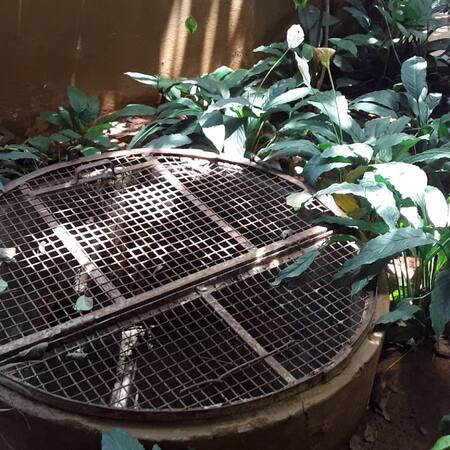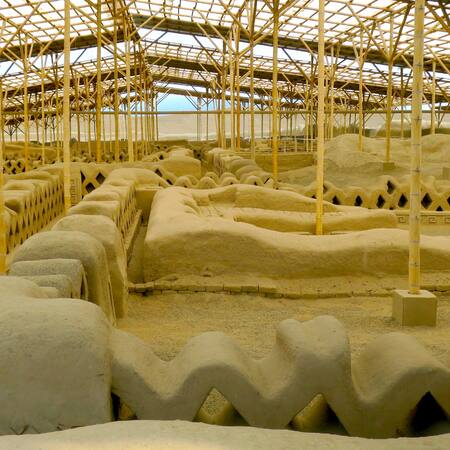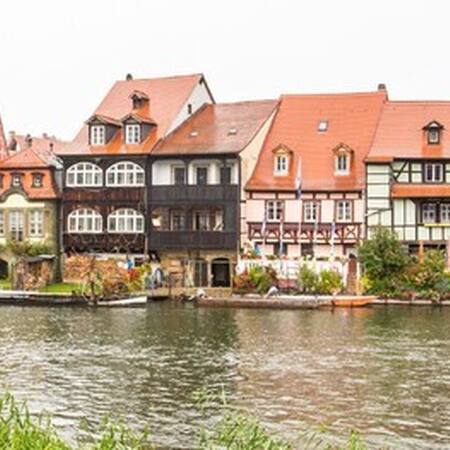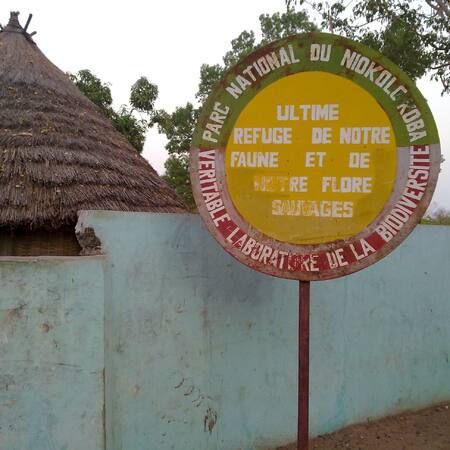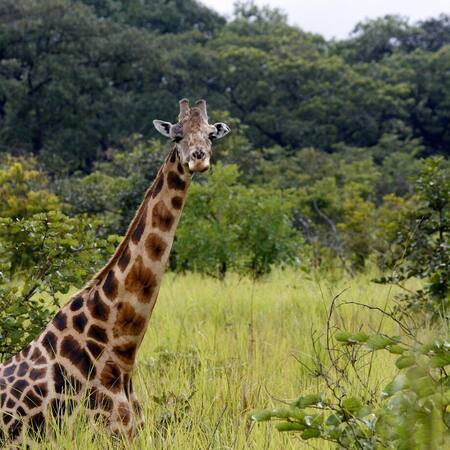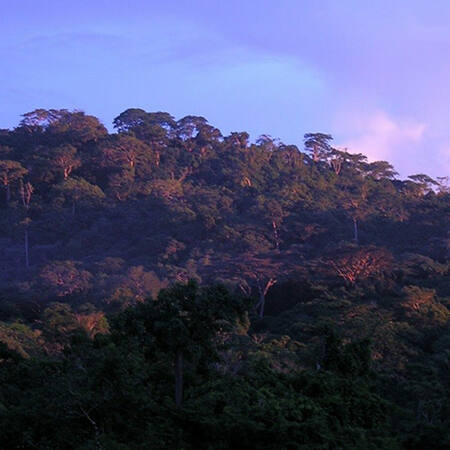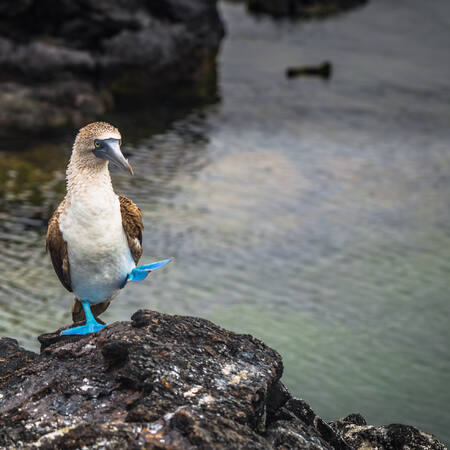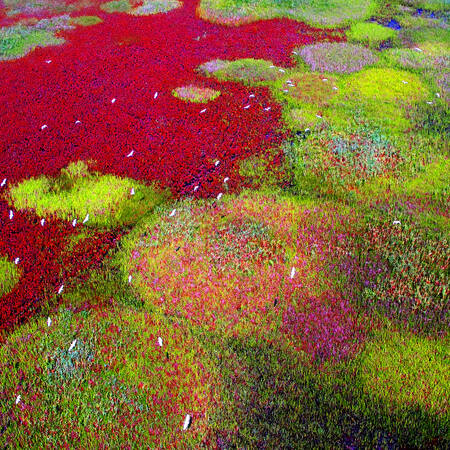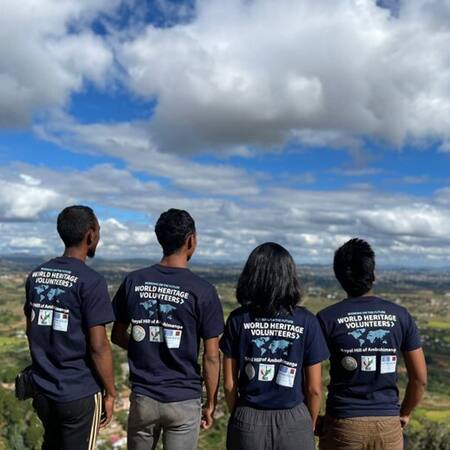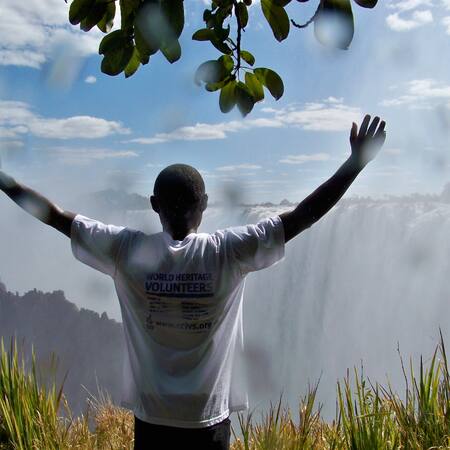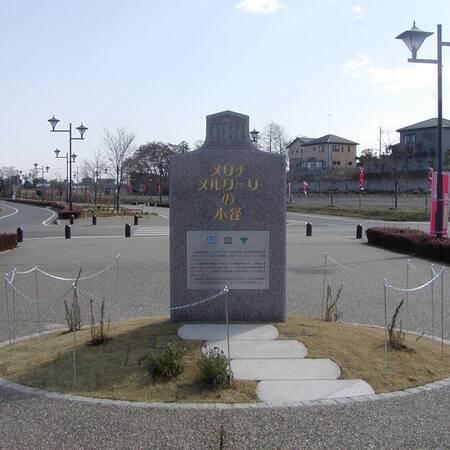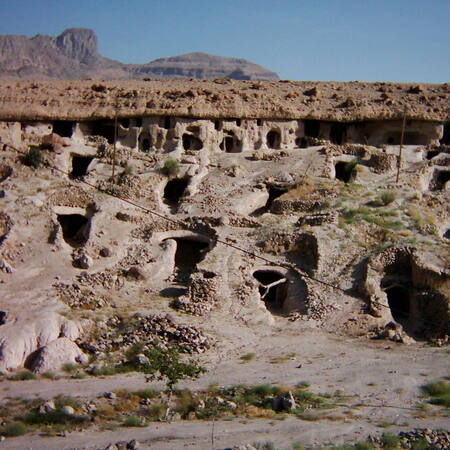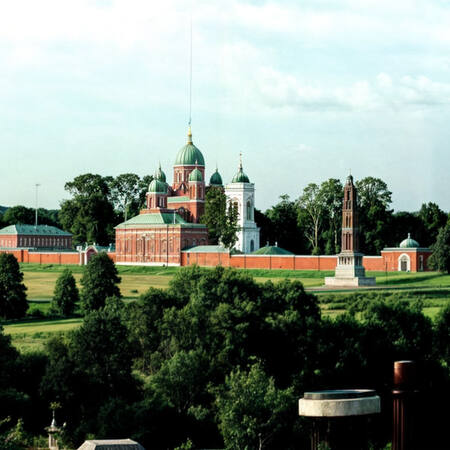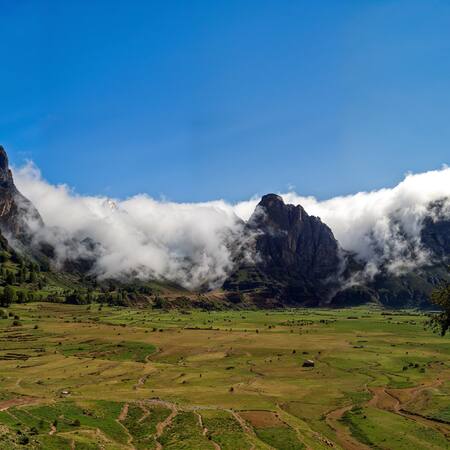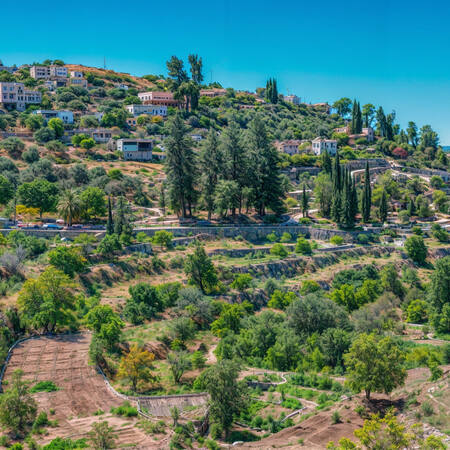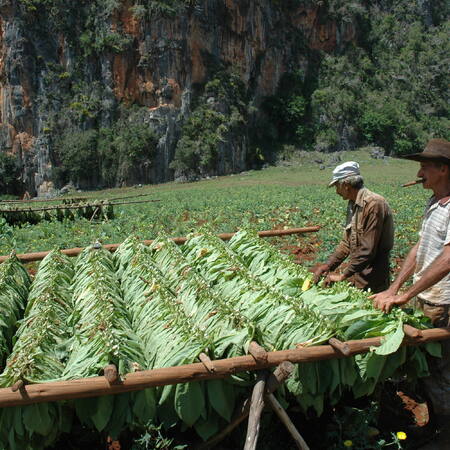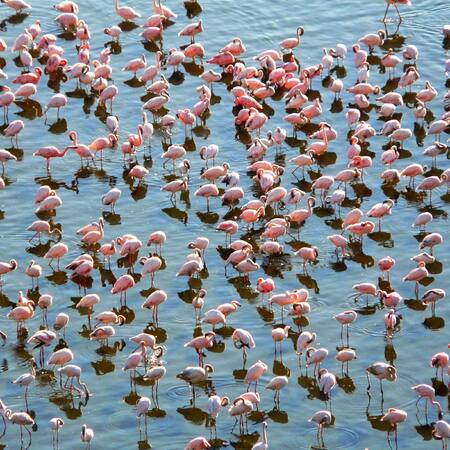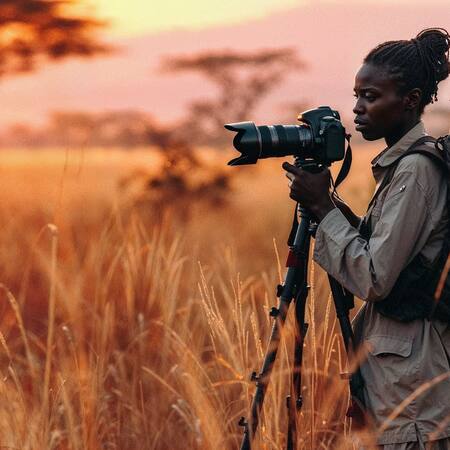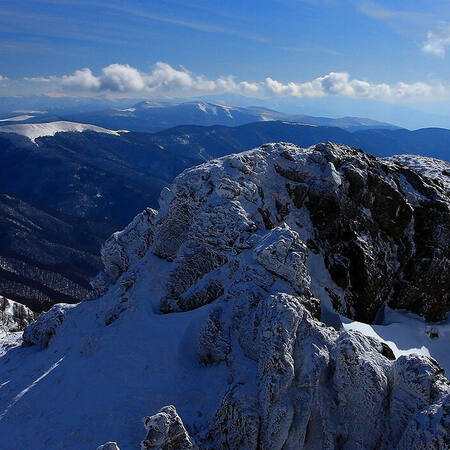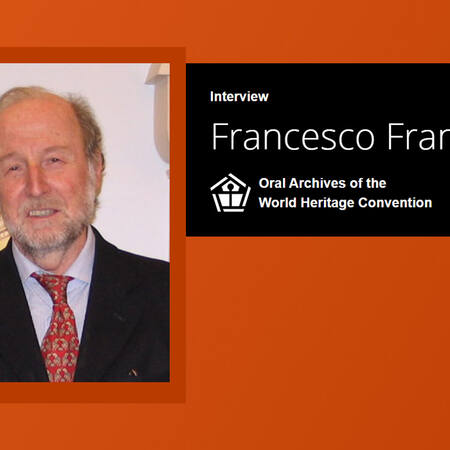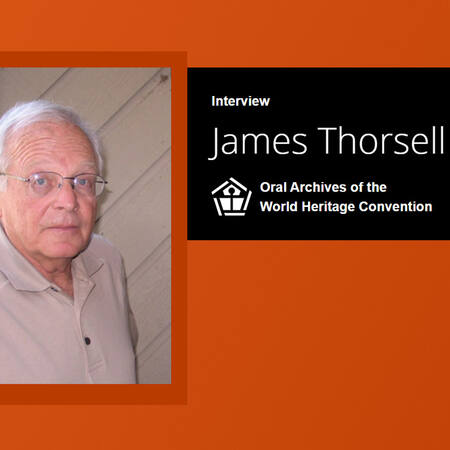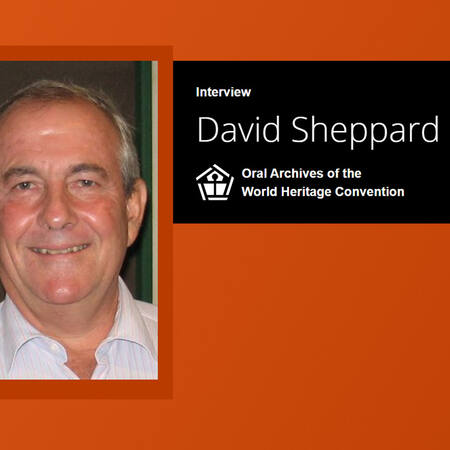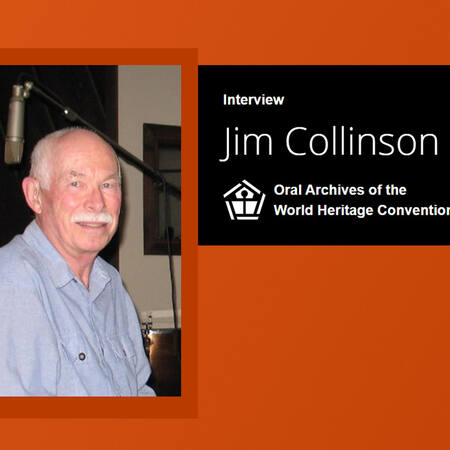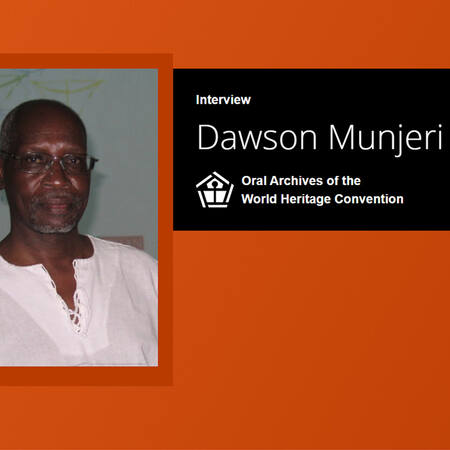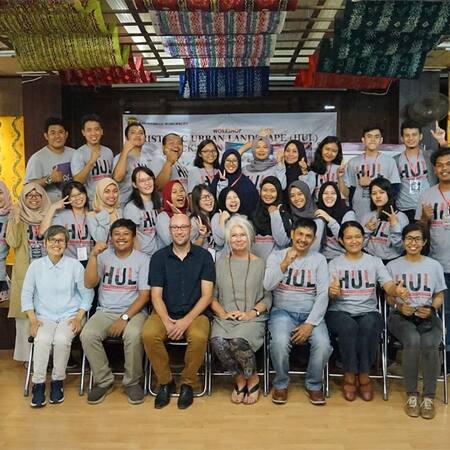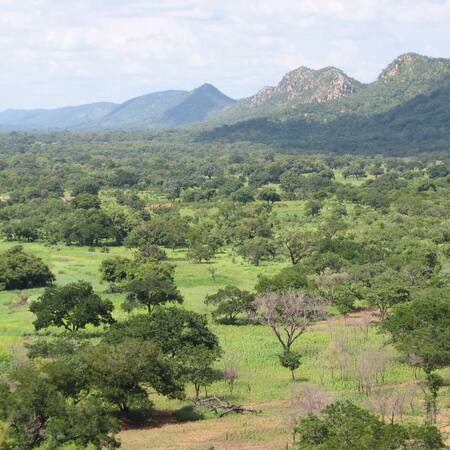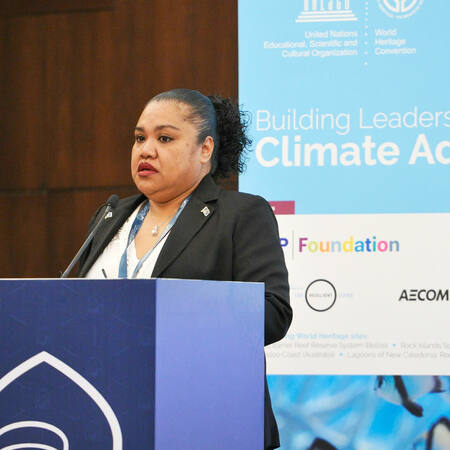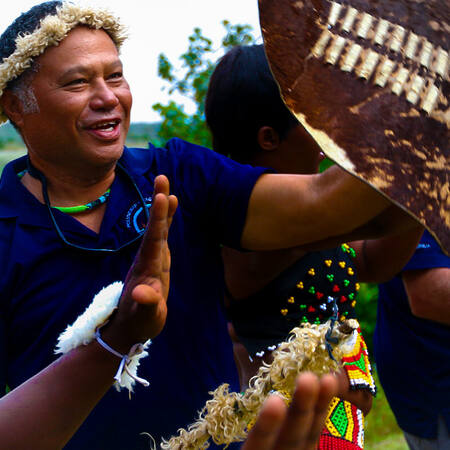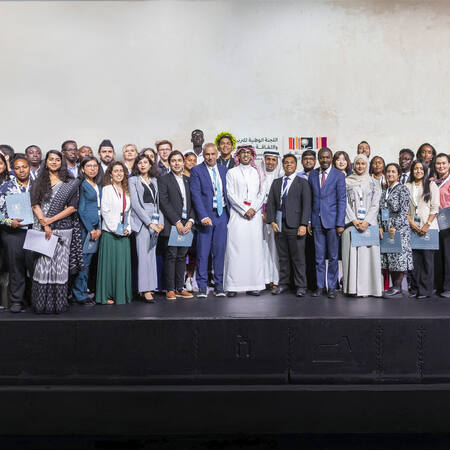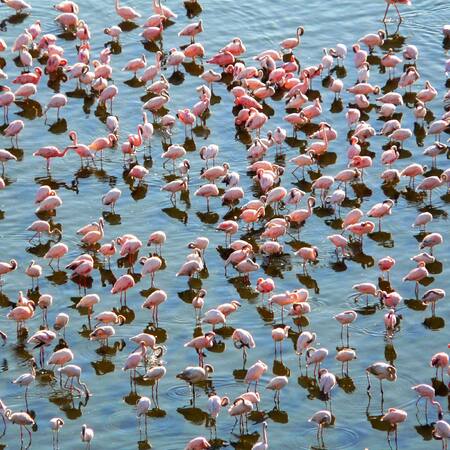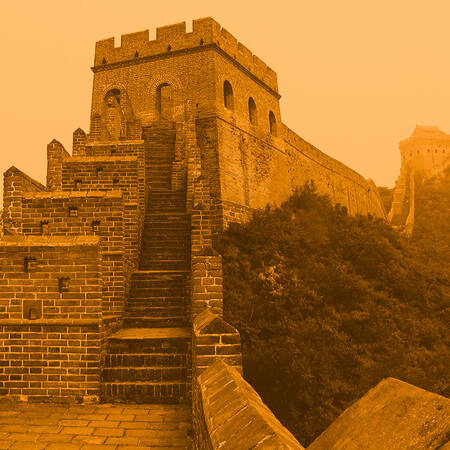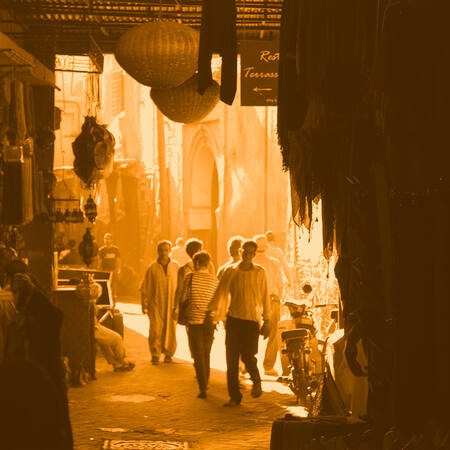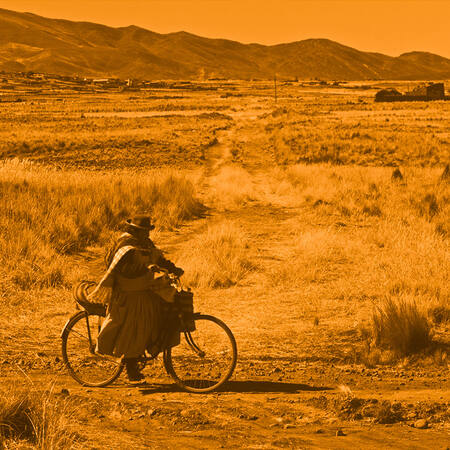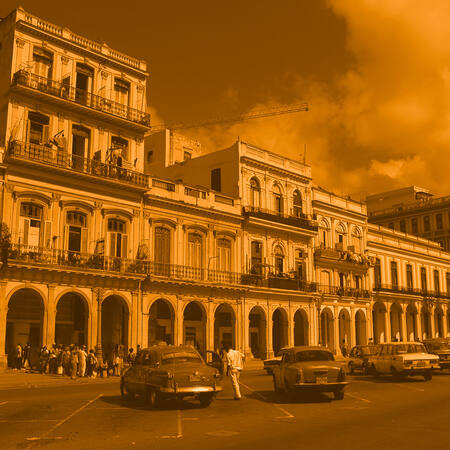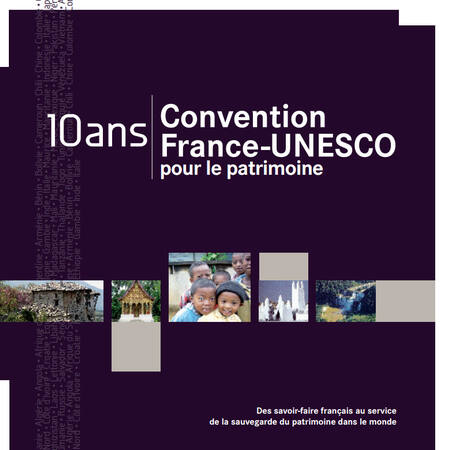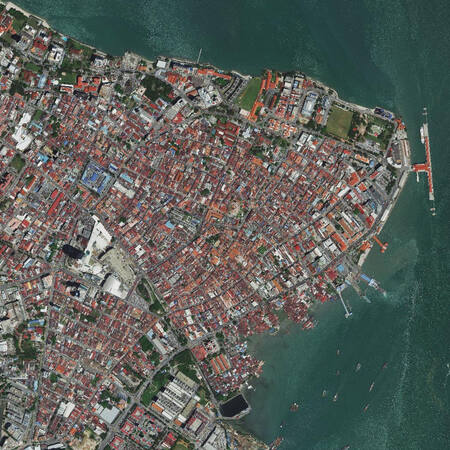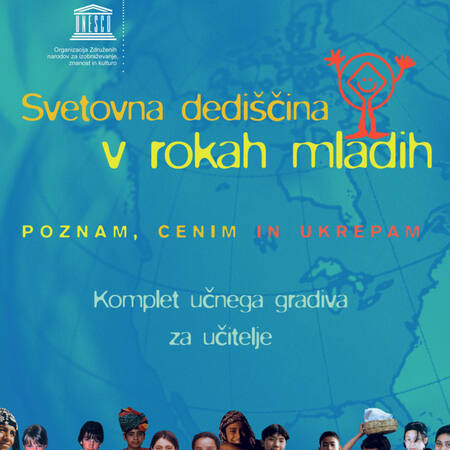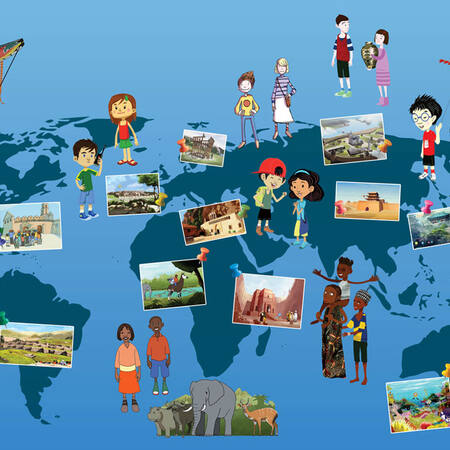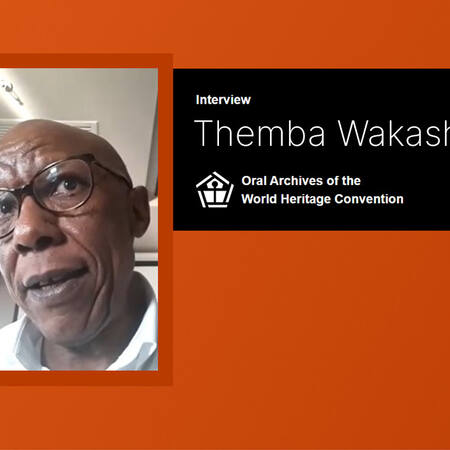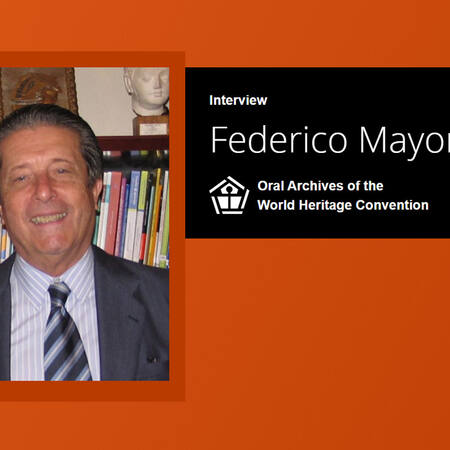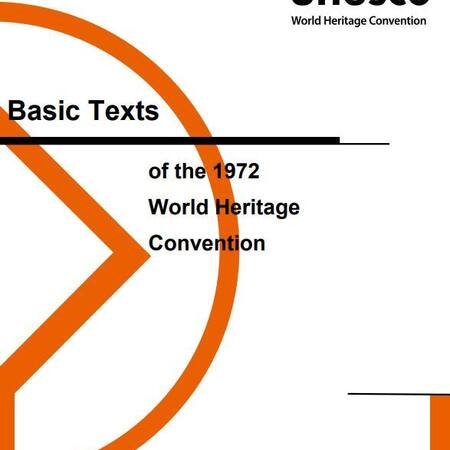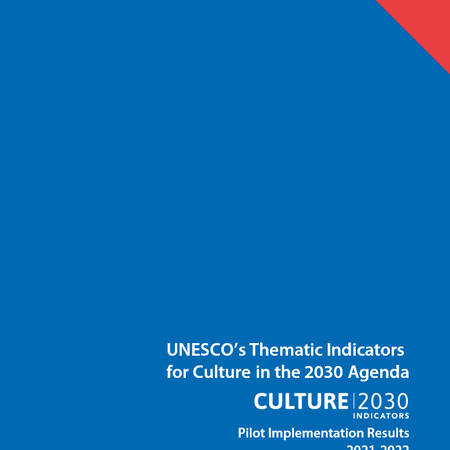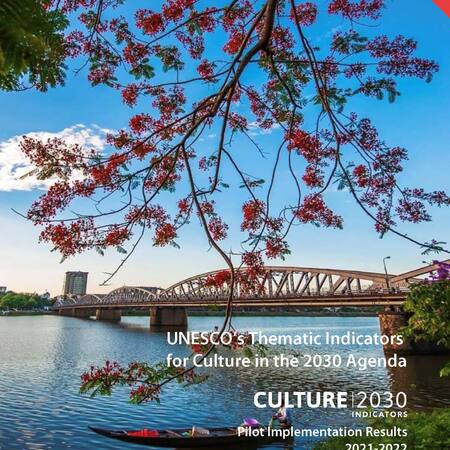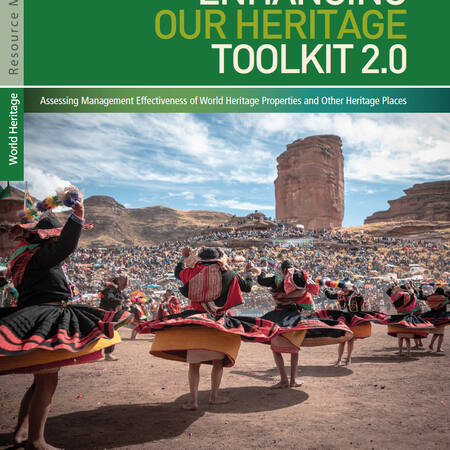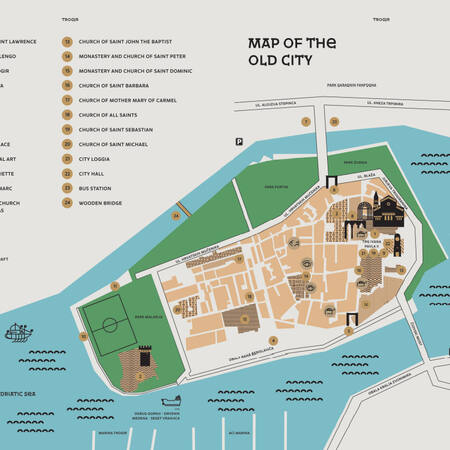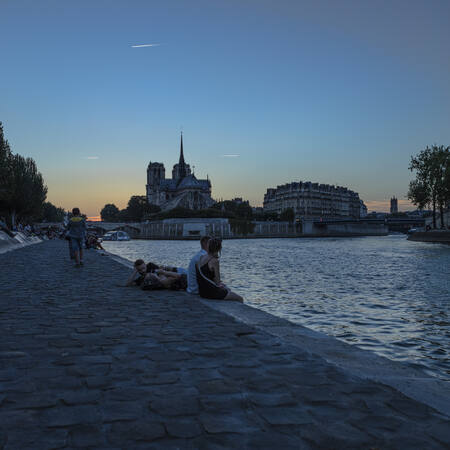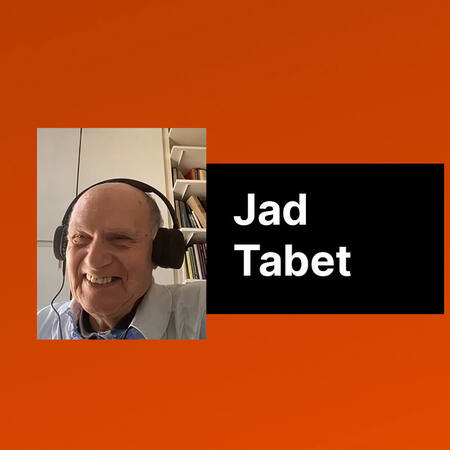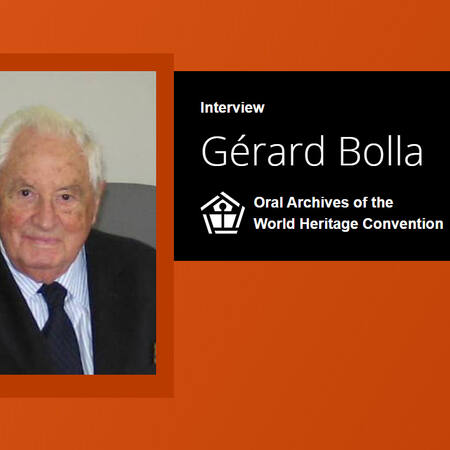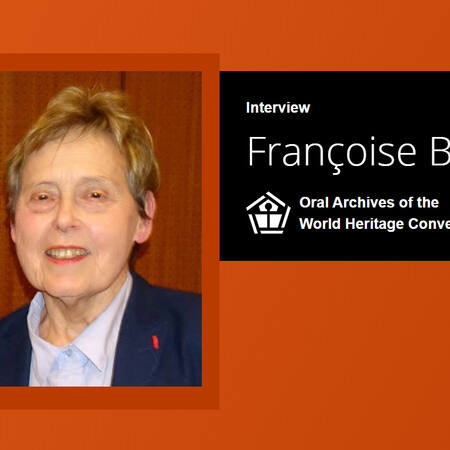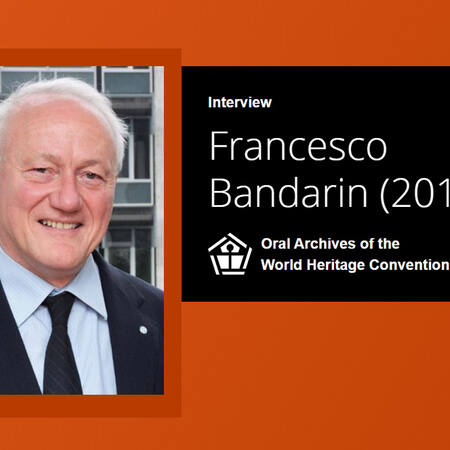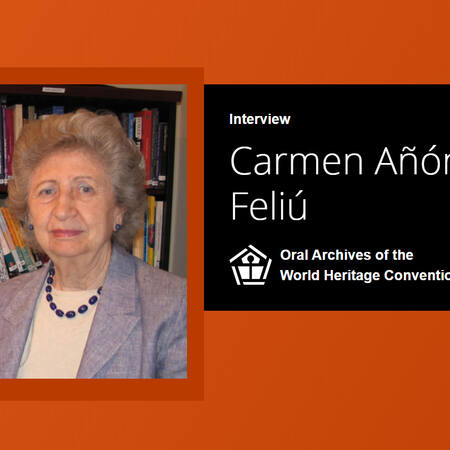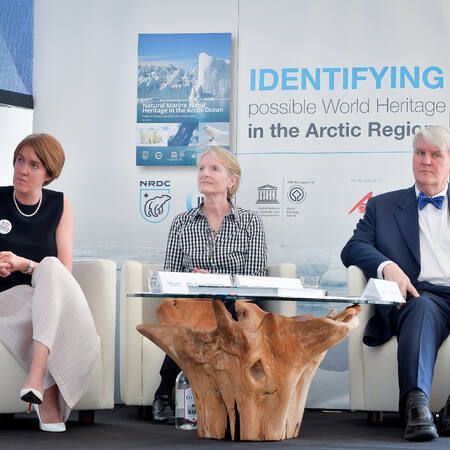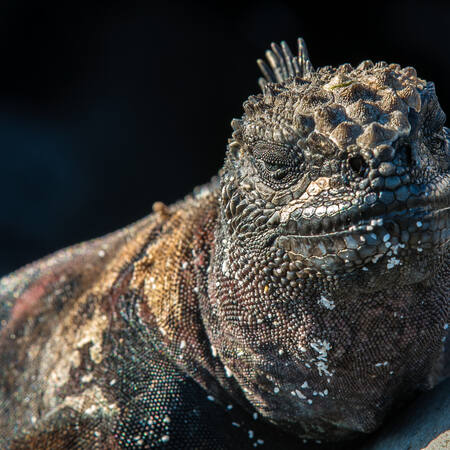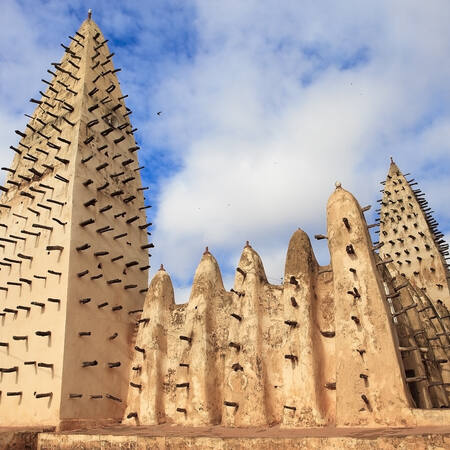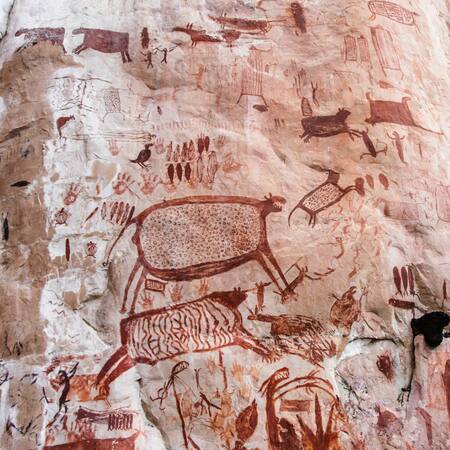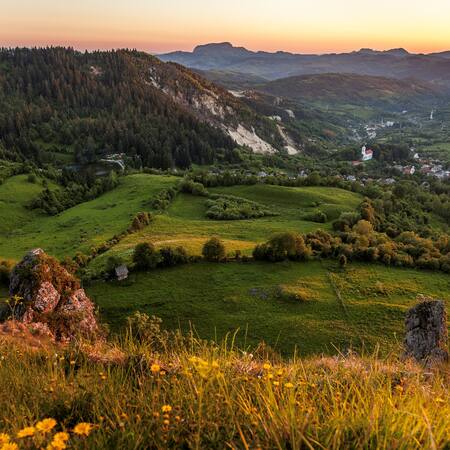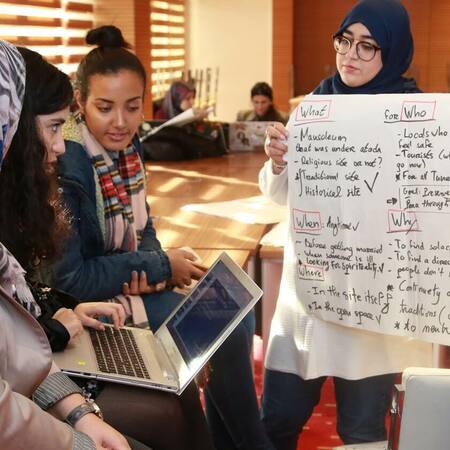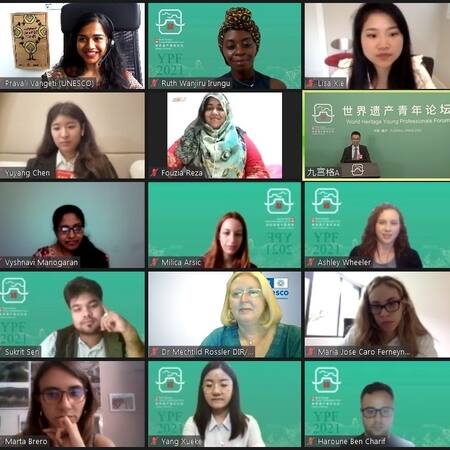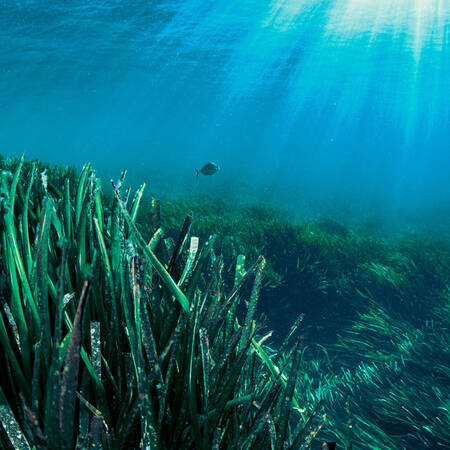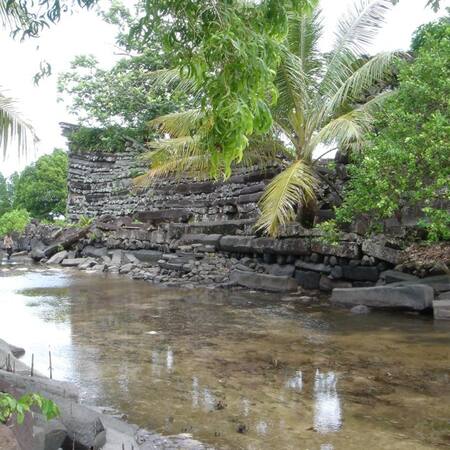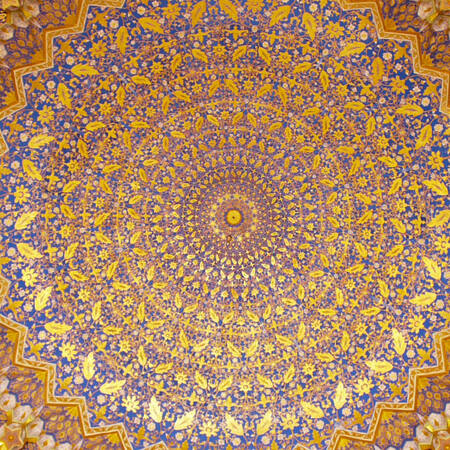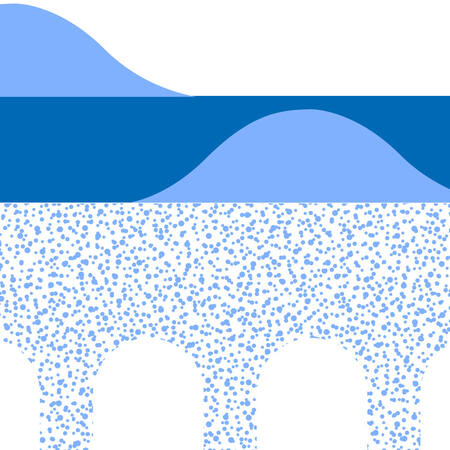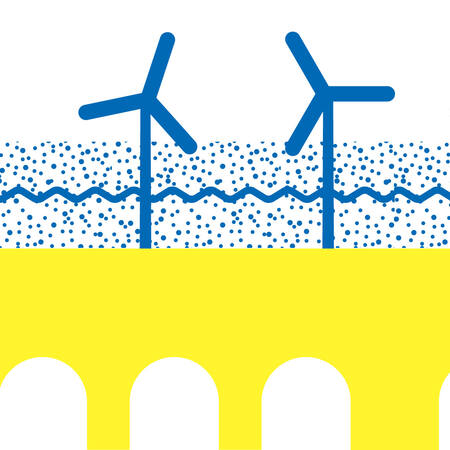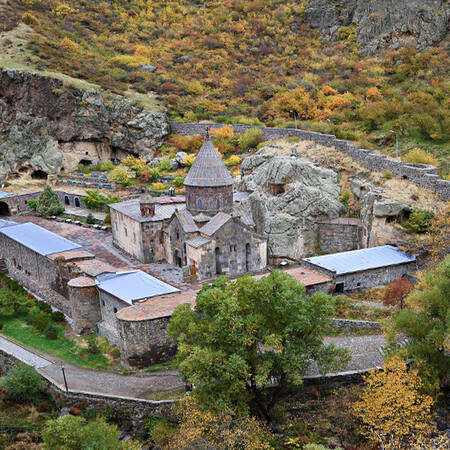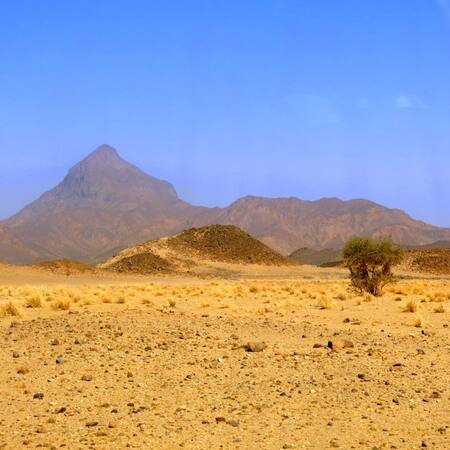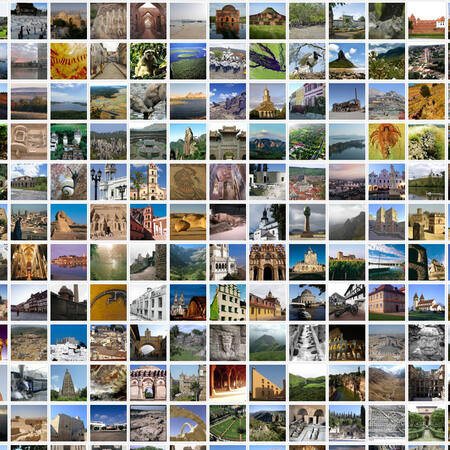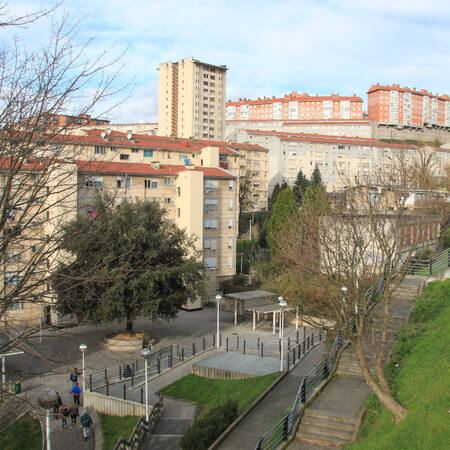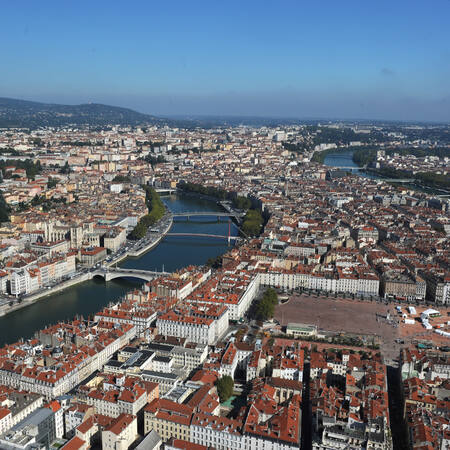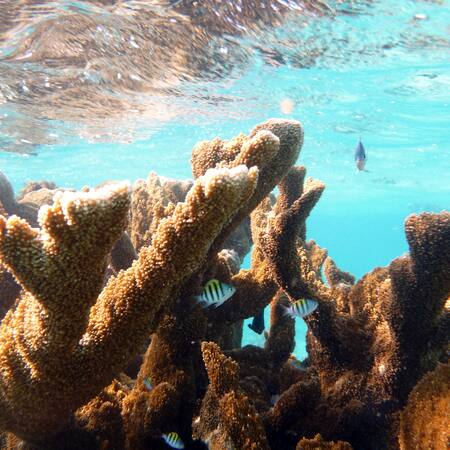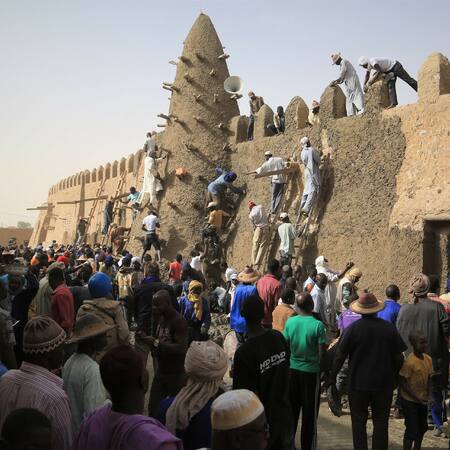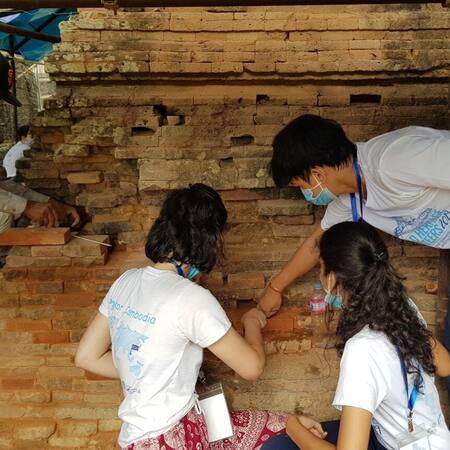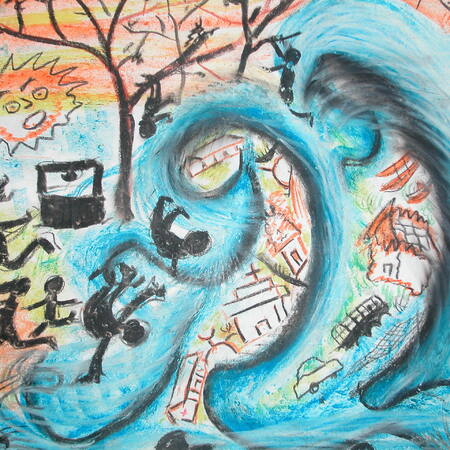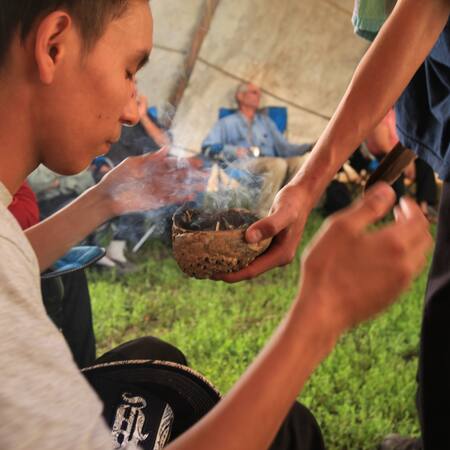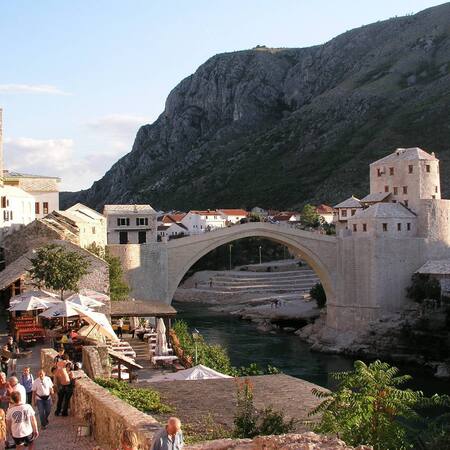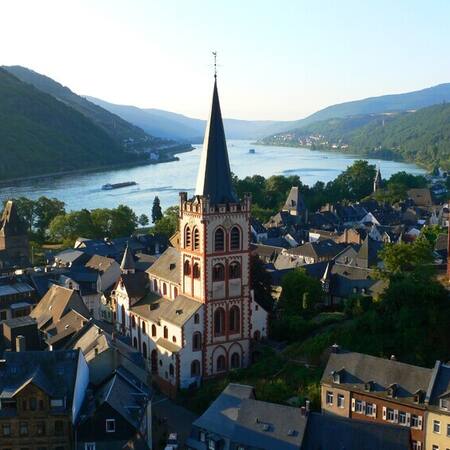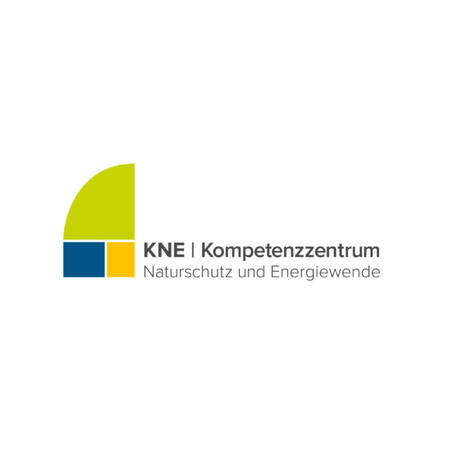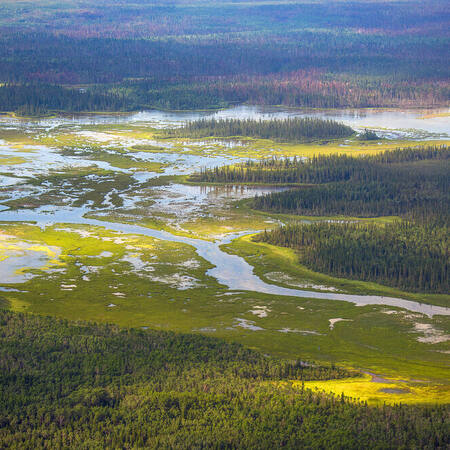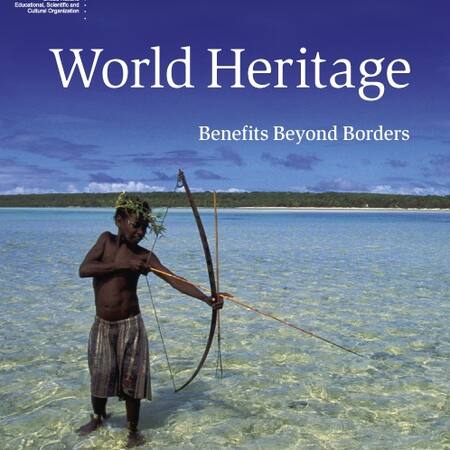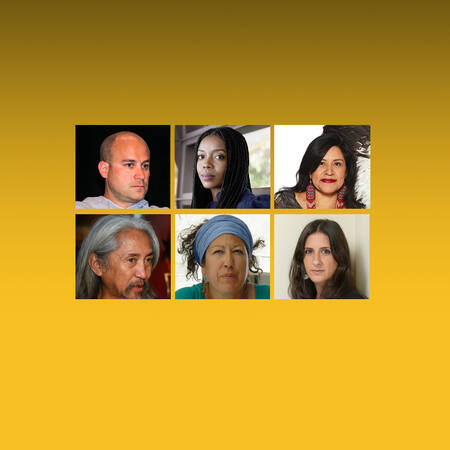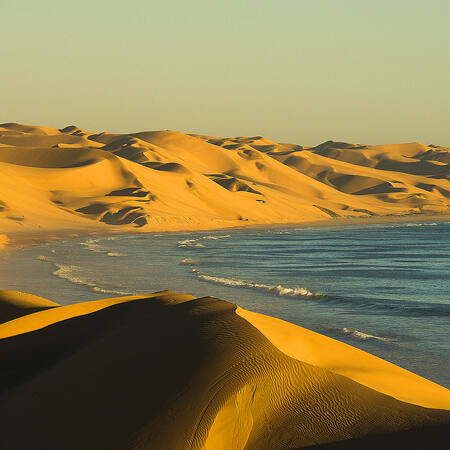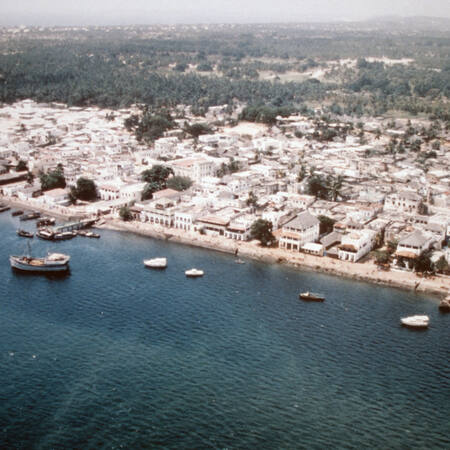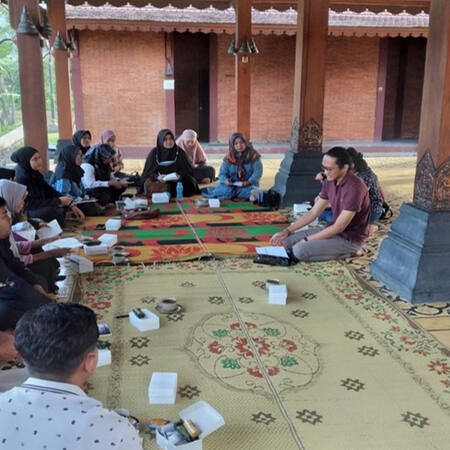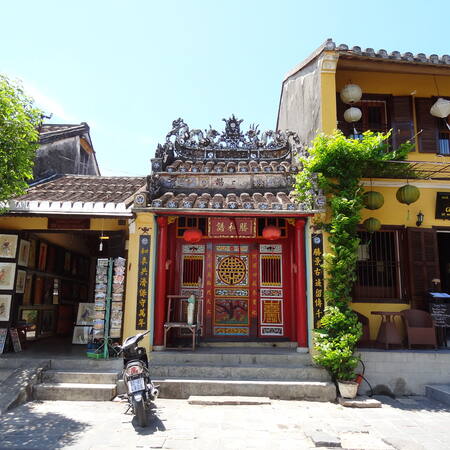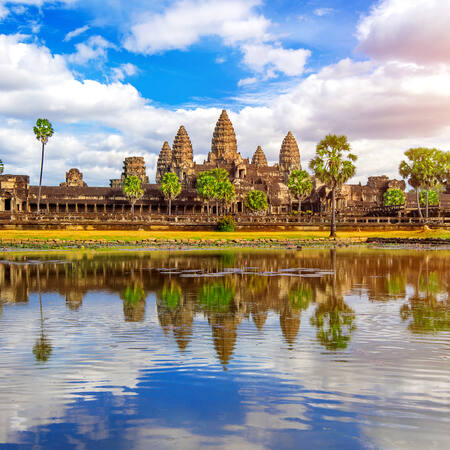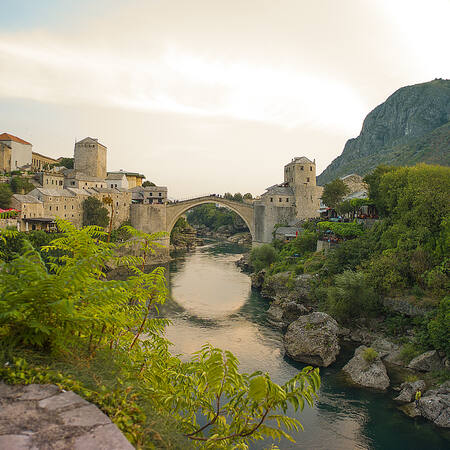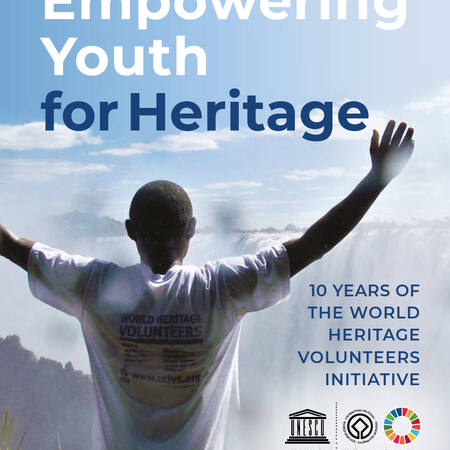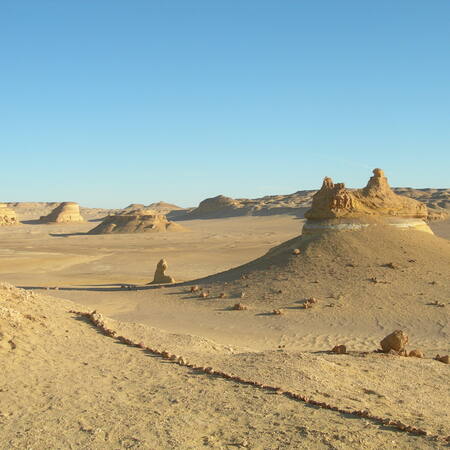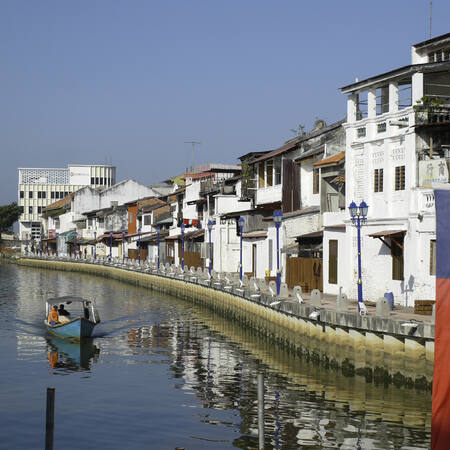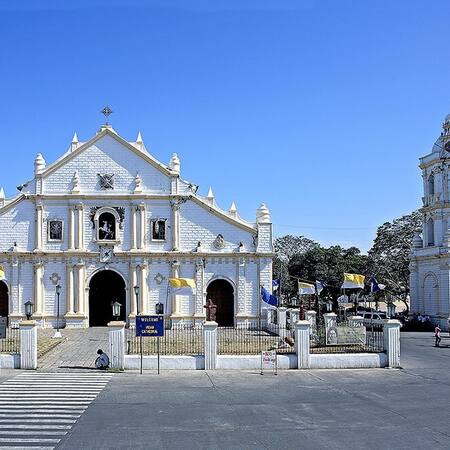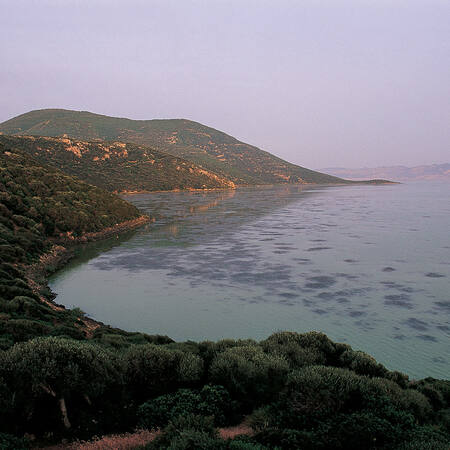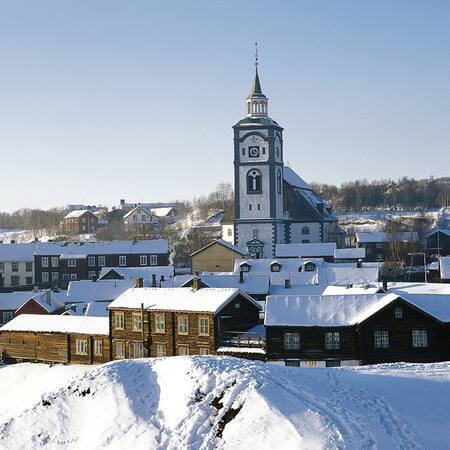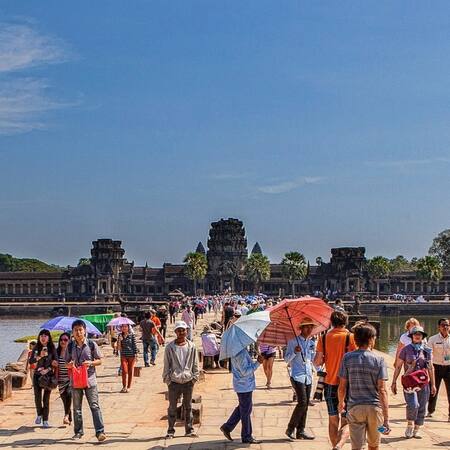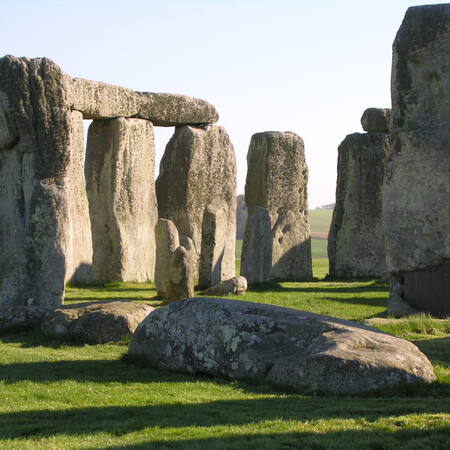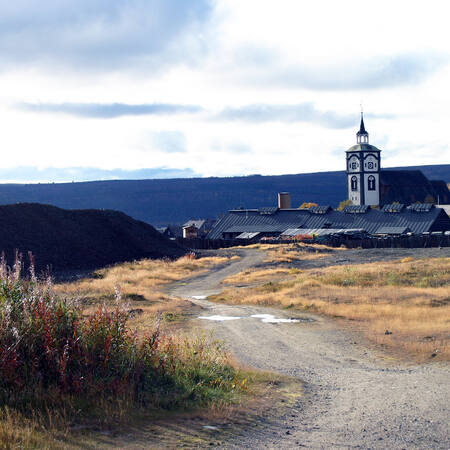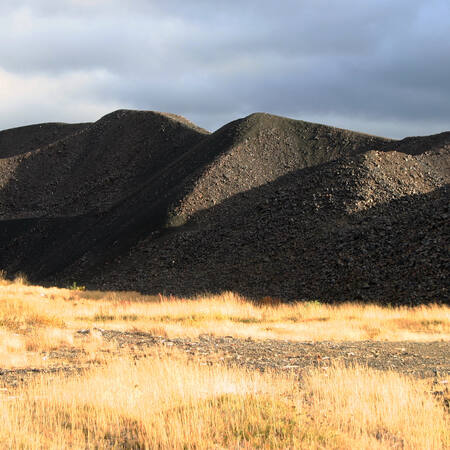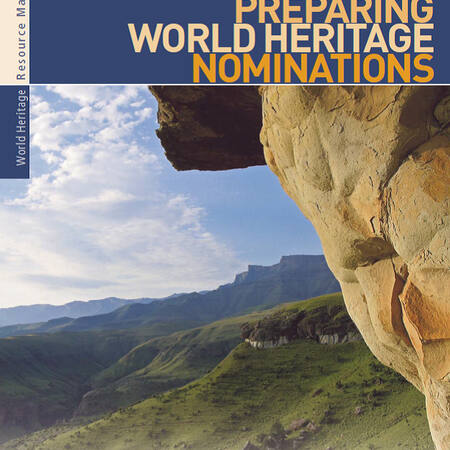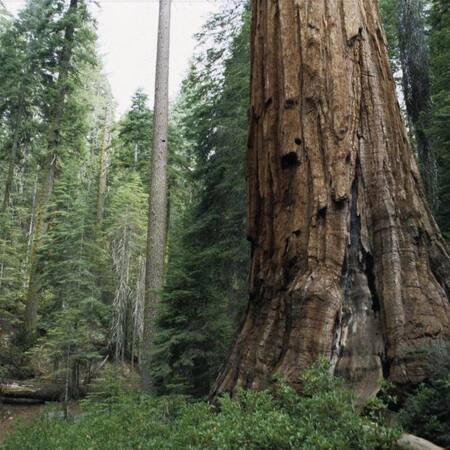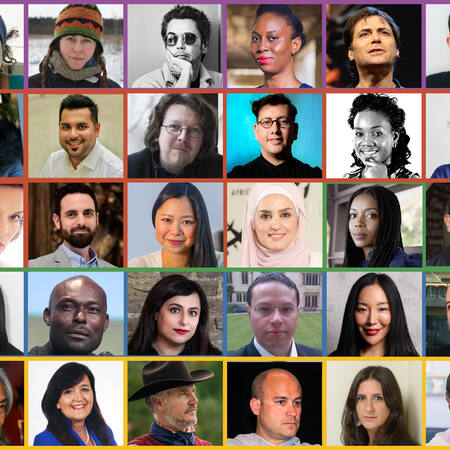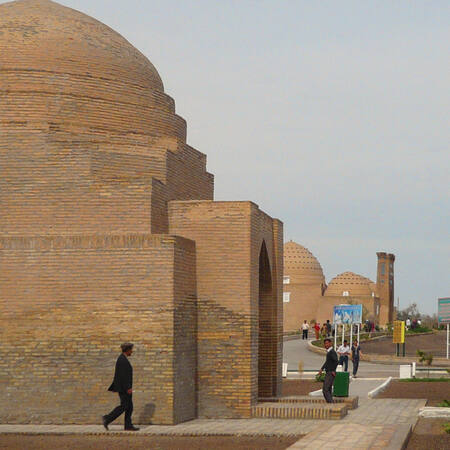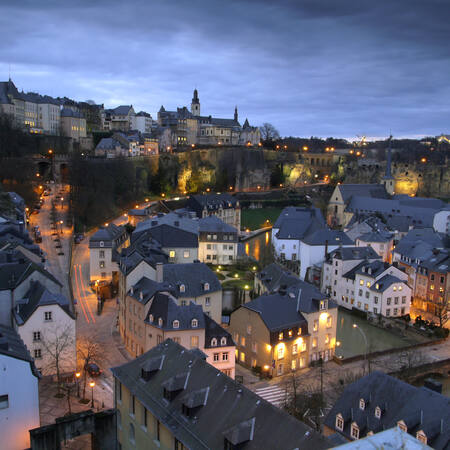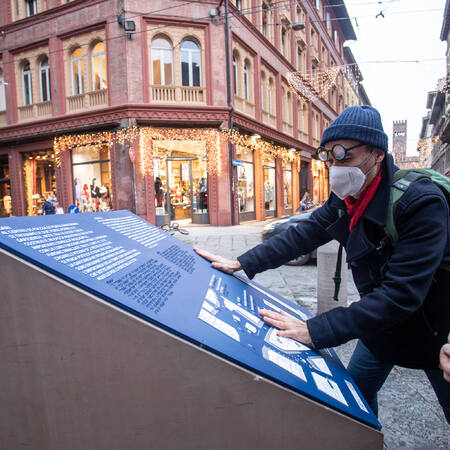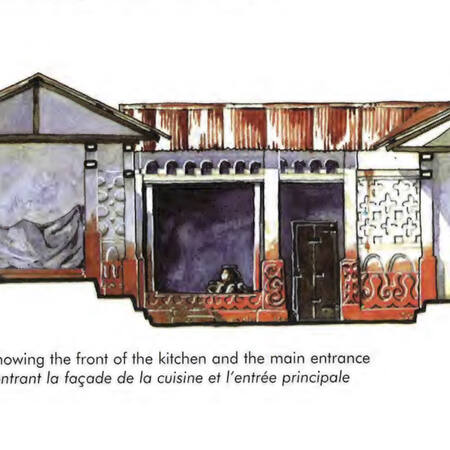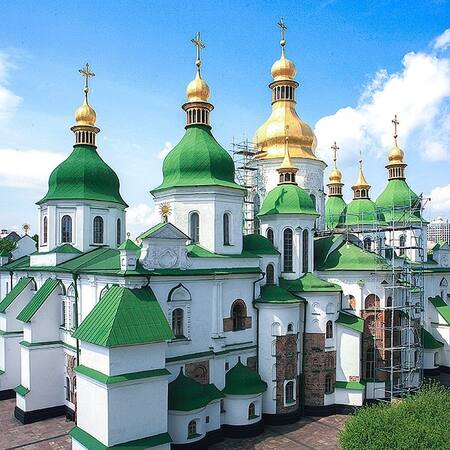Young Professionals Forum 2023
Continuing the 50th anniversary celebrations of the UNESCO World Heritage Convention, the 2023 edition of the World Heritage Young Professionals Forum was implemented in Riyadh in September 2023, reiterating the ...
Dive into Heritage is creating an innovative online platform that leverages digital technologies to safeguard and promote World Heritage sites and its related intangible heritage, and transmit it to future ...
Featured
The objective of the Guidance is to provide easy-to-understand and user-friendly information on wind energy projects and World Heritage protection and management, and to highlight processes and tools for overcoming ...
World Heritage Marine Programme
50 flagship marine protected areas of Outstanding Universal Value: Beacons of Hope In a Changing Ocean
Featured
UNESCO Urban Heritage Atlas: Cultural mapping for historic cities and settlements
The Urban Heritage Atlas is an atlas and an archive that documents and explains, visually, narratively and with analytical maps, the diversity and uniqueness of the world’s historic cities and settlements. As such, ...
Featured
Historic Monuments Zone of Querétaro (Mexico) UNESCO Urban Heritage Atlas: Cultural mapping of historic cities and settlements Plaza de Armas © Roberto Galán / Shutterstock.com* World ...
Under the Almohads and the Hafsids, from the 12th to the 16th century, Tunis was considered one of the greatest and wealthiest cities in the Islamic world. Some 700 monuments, including palaces, mosques, mausoleums, ...
Historic City of Ahmedabad (India) UNESCO Urban Heritage Atlas: Cultural mapping of historic cities and settlements Teen Darwaza, gate of the historic city walls © AnilD / ...
Founded in the 11th and 12th centuries to serve the caravans crossing the Sahara, these trading and religious centres became focal points of Islamic culture. They have managed to preserve an urban fabric that ...
"Located at over 2,000 m above sea level, the capital of Eritrea developed from the 1890s onwards as a military outpost for the Italian colonial power. It is an exceptional example of early modernist urbanism at the ...
Historic Centre of Cordoba (Spain) UNESCO Urban Heritage Atlas: Cultural mapping of historic cities and settlements Jocelyn Erskine-Kellie, CC BY-SA, via Flickr World Heritage Cities UNESCO ...
Young Professionals Forum 2024
As an integral part of the 46th session of the World Heritage Committee and in the framework of the UNESCO World Heritage Education Programme, the Ministry of Culture through the Archaeological Survey of India, will ...
Marine World Heritage in a Changing Climate © Climate change has become the biggest threat to the conservation of the 51 marine sites on UNESCO’s World Heritage List. Some 70% of these sites are ...
Marine Programme: World Heritage marine managers
World Heritage Marine Managers A flagship network empowered to transform how we protect Watch © The World Heritage List includes 51 marine sites across 37 nations. Local managers at these sites ...
World Heritage Online Map Platform
Funded by the Flanders UNESCO Trustfund (FUT), an online geographic information system for World Heritage is being developed.
Featured
Thesis on World Heritage issues and/or World Heritage Sites
Authors of thesis are encouraged to send an abstract of their work and their personal data by filling the attached form. This will allow academics and researchers to know about their domain of research and to ...
World Heritage Cities Programme
The World Heritage Cities Programme is one of six thematic programmes formally approved and monitored by the World Heritage Committee. The programme concerns the development of a theoretical framework for urban ...
Featured
UNESCO Culture|2030 Indicators Expert Facility
The Expert Facility is an international pool of recognized experts that have relevant experience to support countries and cities in implementing the UNESCO Culture|2030 Indicators
New and Old Towns of Edinburgh (United Kingdom of Great Britain and Northern Ireland)UNESCO Urban Heritage Atlas: Cultural mapping of historic cities and settlements © Chris Fleming, CC BY-SA 2.0, via ...
Houses in the historical centre of Samarkand are rarely more than 100 years old but follow centuries-old traditions in their sitting and typological organisation, use of interior spaces and construction practices. ...
Inhabited since 250 B.C., Djenné became a market centre and an important link in the trans-Saharan gold trade. In the 15th and 16th centuries, it was one of the centres for the propagation of Islam. Its traditional ...
Although the overall urban fabric and townscape give Stone Town its unique character, many individual buildings of historical and architectural significance represent local architecture and building traditions. ...
The following audio excerpts are from a virtual interview with Oliver Martin conducted by Christina Cameron and Mechtild Rössler in August 2023. Oliver Martin discusses the impact of the Cairns reforms, particularly ...
Oral Archives of the World Heritage Convention
Oral Archives of the World Heritage Convention Canada Research Chair on Built Heritage --> Under the leadership of the Canada Research Chair on Built Heritage at the University of Montreal, ...
Oral Archives: Amadou-Mahtar M’Bow
The following audio excerpts are from an interview with Amadou-Mahtar M'Bow by Mechtild Rössler and Petra Van Den Born the 22 October 2009 in Paris, France. In particular, he gives an account of UNESCO's first ...
World Heritage and Sustainable Tourism Programme
The UNESCO World Heritage and Sustainable Tourism Programme represents a new approach based on dialogue and stakeholder cooperation where planning for tourism and heritage management is integrated at a destination ...
Featured
World Heritage Site Managers' Forum
In recent years, it has become an established practice that a forum is organised in conjunction with each World Heritage Committee session. Since the 41st session of the Committee (Krakow, 2017), site managers from ...
Featured
Understanding, managing and conserving World Heritage properties requires up-to-date knowledge and well-honed skills. To help build the capacity of all stakeholders in World Heritage – whether they are ...
Featured
World Heritage Programme for Small Island Developing States (SIDS)
Small Island Developing States (SIDS) are islands of the Caribbean Sea and the Atlantic, Indian and Pacific Oceans. They are some of the most beautiful places on Earth, with atolls of white sand beaches, mountain ...
Featured
Retrospective Inventory and "boundary clarifications"
The Retrospective Inventory is a project aiming at the identification and collection of baseline data (such as boundaries, geographical coordinates, serial components, area of properties in hectares, etc.) for ...
Renewable Energy Transition and World Heritage
Climate change is one of the defining issues of our time, and with over 30 programs in the sciences, education, culture and communication sector, UNESCO is actively contributing to create knowledge, educate and ...
The UNESCO-Greece Melina Mercouri International Prize for the Safeguarding and Management of Cultural Landscapes was created in 1995 to reward outstanding examples of action to safeguard and enhance the world’s ...
This large format full-color map features the World Heritage sites and brief explanations of the World Heritage Convention and the World Heritage conservation programmes, as well as superb photos of World Heritage ...
Featured
Uplifting the perception of the List of World Heritage in Danger
The World Heritage Centre has developed a project with the objective to conduct an overall reflection and study on the image/perception of the List of World Heritage in Danger and to propose approches aiming at ...
Guidance and Toolkit for Impact Assessments in a World Heritage Context
UNESCO and the Advisory Bodies to the World Heritage Committee have issued new guidance for assessing impacts from projects that could potentially affect the planet’s most precious heritage places. Designed ...
Featured
Promoting traditional environmental knowledge in the M’Zab Valley (Algeria)
The traditional settlements of the M’Zab valley were adapted to their environment and climate. Floodable areas were occupied only by temporary structures and not by dwellings. Water infrastructure was a core ...
A research project tests tools such as photogrammetry, laser scanning and community mapping, to record the interaction between tangible and intangible layers of traditional settlements in China and India.
The Million wells for Bengaluru campaign is an initiative to build one million shallow wells using traditional well-digging techniques. The initiative for the revival of traditional water systems integrates ...
Preventing climate-related impacts in the Chan Chan Archaeological Zone (Peru)
After Chan Chan was placed on the List of World Heritage in Danger, a disaster risk reduction plan was developed and integrated with heritage management mechanisms. The plan provided valuable strategies for ...
Reintroduction of hydropower in the mills district of the Town of Bamberg (Germany)
The installation of a new water turbine at the site of the former water mills in the Town of Bamberg follows traditional water practices while respecting the Outstanding Universal Value of the property. The new ...
Promoting climate change adaptation and mitigation in Lamu Old Town (Kenya)
Lamu Old Town faces multiple threats from climate change, energy needs and rapid social and economic transformation. The Lamu Old town management plan and the Lamu Municipality Waste Management Policy focused on ...
The World Heritage properties of Africa face a variety of threats from armed conflict to development pressures, rapid urbanisation, growth and climate change. Several of these properties are located in conflict and ...
Toward removing Niokolo-Koba National Park from the List of World Heritage in Danger
Created in 1954, the park was inscribed on the UNESCO World Heritage List in 1981 under criterion (x) for its rich fauna, its unique ecosystems, and its remarkable diversity of wildlife. However, in 2007, various ...
Salonga National Park boundary demarcation project
Created in 1970, the park is the second largest forest park in the world in terms of size. It boasts an extraordinary biological richness, with diverse vegetation that constitutes important habitats for species. ...
Ecological Monitoring in Garamba National Park
Over the last decades, Garamba National Park has been a major target of militant ivory and bushmeat poachers, which threatens the site drastically. Therefore, an effective law enforcement strategy and ecological ...
Conflict mitigation in Okapi Wildlife Reserve
With 13,720 km², the Okapi Wildlife Reserve has rich biodiversity and a forest ecosystem with cultural and economic importance for the traditional nomadic pygmy hunters Mbuti and Efe who it is believed, have been ...
Securing Manovo-Gounda St. Floris National Park
play_arrow The Manovo-Gounda St Floris National Park (PNMGSF) is the largest park in the Central African savannas. Inscribed on UNESCO World Heritage List in 1988, the park is a unique refuge of biodiversity, ...
Ecological restoration of the Air and Ténéré Natural Reserves
In 1992, one year after its inscription, the Air and Ténéré Natural Reserves were placed on the List of World Heritage in Danger due to the deterioration of the state of conservation of the property, caused by ...
Avian Flu – A Threat to Biodiversity
Highly pathogenic avian influenza, known as bird flu, is causing significant mortality of wild birds and mammals worldwide, requiring authorities to take action to curb its spread. Previously affecting mostly ...
World Heritage and Biodiversity
Biological diversity underpins ecosystem functioning and the provision of ecosystem services essential for human well-being. World Heritage properties are the most outstanding places on the planet and constitute a ...
Featured
World Heritage Volunteers 2024 Campaign
The UNESCO World Heritage Centre is pleased to announce the selected projects of the World Heritage Volunteers (WHV) 2024 Campaign, under the theme of ‘World Heritage Volunteers 2024 - Working on the Future’.
In recent years, the framework for training and research in the field of World Heritage has changed significantly. Among the factors that have contributed to these rapid changes, is the emerging of many new ...
Featured
Synergies to protect World Heritage
Synergies to protect Global Heritage Cooperation with other Conventions and programmes © The World Heritage Committee recognises the benefits of closer coordination and synergies between global ...
World Heritage Volunteers Initiative
World HeritageVolunteers Initiative Within the framework of the UNESCO World Heritage Education Programme, the World Heritage Volunteers (WHV) Initiative was launched in 2008 in collaboration with the Coordinating ...
Featured
The UNESCO-Greece Melina Mercouri International Prize for the Safeguarding and Management of Cultural Landscapes has been awarded for 2001 jointly to Murjadjo Djebel, Planters' Wood and Old Town of Sid Hourari ...
The Park of Koga (Japan) was awarded the Melina Mercouri International Prize for the Safeguarding and Management of Cultural Landscapes for its 2003 edition. Park of KogaJapan Park of Koga (Japan) © ...
The historical village of Maymand in southern Iran has been awarded the UNESCO-Greece Melina Mercouri International Prize for the Safeguarding and Management of Cultural Landscapes for its 2005 edition. The prize ...
The Borodino Battlefield in the Russian Federation was awarded the Melina Mercouri International Prize for the Safeguarding and Management of Cultural Landscapes.
The Gunditjmara community was awarded the 2023 edition of the UNESCO-Greece Melina Mercouri International Prize for the Safeguarding and Management of Cultural Landscapes in recognition of its outstanding efforts to ...
The Public Institute of Kozjansko Park in Podsreda (Slovenia) was awarded the 2021 edition of the UNESCO-Greece Melina Mercouri International Prize or the Safeguarding and Management of Cultural Landscapes.
The 2019 UNESCO-Greece Melina Mercouri International Prize for the Safeguarding and Management of Cultural Landscapes was awarded on 18 November to Instituto do Património Cultural in Cabo Verde for its outstanding ...
In 2011, the UNESCO-Greece Melina Mercouri International Prize for the Safeguarding and Management of Cultural Landscapes has been awarded jointly to Battir Cultural Landscape (Palestine) and the Museum-Reservation ...
The UNESCO-Greece Melina Mercouri International Prize for the Safeguarding and Management of Cultural Landscapes has been awarded for its first edition in 1999 jointly to Valle de Viñales (Cuba), the Elishia's Park ...
Culture|2030 Indicators Kenya and the city of Nakuru Project Page
UNESCO Kenya and the City of Nakuru Project Page © IUCN Partners Implementation of the UNESCO Culture|2030 Indicators in Kenya and the city of Nakuru is with the support and partnership of ...
UNESCO Mentorship Programme for African Heritage professionals
The UNESCO Mentorship Programme was developed in 2020, in collaboration with the African World Heritage Fund (AWHF) and the three Advisory Bodies (ICOMOS, ICCROM and IUCN) to create opportunities for African ...
The World Heritage Convention is one of the most successful international instruments to protect the most extraordinary natural places on the planet, characterized by their natural beauty or outstanding ...
Featured
Oral Archives: Francesco Francioni
The following audio excerpts are from an interview with Francesco Francioni by Christina Cameron and Mechtild Rössler the 10 May 2010 in Rome. He offers an interesting overview of the Convention's mechanisms from a ...
The following audio excerpts are from an interview with Jim Thorsell by Christina Cameron the 11 August 2010 in Banff, Canada. Thorsell explains the prominent role he played in IUCN's World Heritage activities for ...
The audio excerpts are from an interview with David Sheppard by Christina Cameron and Mechtild Rössler in Kyoto, Japan the 8 November 2012. He discusses various World Heritage issues such as the length of the List, ...
Interview Jim Collinson 1939-2024 Oral Archives of the World Heritage Convention After studying Agricultural Economics at the University of Manitoba, Jim Collinson completed a ...
The audio excerpts are from an interview with Dawson Munjeri by Christina Cameron the 3 August 2010 in Brasilia, Brazil. He draws on his rich experience with the World Heritage Convention to comment on the ...
Oral Archives: Souayibou Varissou
The following audio extracts are taken from a virtual interview conducted with Souayibou Varissou by Christina Cameron and Mechtild Rössler in December 2022. Mr. Varissou shares his extensive experience in the ...
Designer, engraver and graphic artist, Michel Olyff created dozens of logos, emblems, posters, lithographs, stamps and other arts.
World Heritage Convention 40th anniversary
World Heritage is a building block for peace and sustainable development. It is a source of identity and dignity for local communities, a wellspring of knowledge and strength to be shared. In 2012, as we celebrate ...
World Heritage Youth Forum (2009) 1st Ibero-American
In conjunction with the 33rd session of the World Heritage Committee, sixty-eight participants, of which, thirty-nine secondary school students from 10 countries learned new skills to preserve and conserve the ...
Adapting the approach of the HUL Recommendation for Indonesian universities
The 2021 publication Historic Urban Landscape (HUL) Quick Scan Method. Handbook for Indonesian University Lecturers aims to adapt the HUL Approach to the Indonesian context and promote interdisciplinary learning in ...
Over the past few years, the security situation at the W-Arly-Pendjari Complex has become a major concern as several armed groups have been operating in the region, causing the evacuation of management staff in some ...
Shaping the future of climate adaptation through Resilient Reefs
Climate change is today the biggest threat to coral reefs. Under a business-as-usual scenario, nearly 90% of the 29 World Heritage-listed coral reefs are expected to severely bleach twice-per-decade by 2040.
Funded by the Government of Japan through the UNESCO/Japanese Funds-in-Trust, implementation from 2022 to 2024. Four World Heritage sites from Asia, Africa, the Arab region and Latin America and the Caribbean work ...
The UNESCO Thematic Indicators for Culture in the 2030 Agenda (Culture|2030 Indicators) is a framework of thematic indicators whose purpose is to measure and monitor the progress of culture’s enabling contribution ...
Featured
Climate Change and World Heritage
World Heritage properties are affected by the impacts of climate change at present and in the future. Their continued preservation requires understanding these impacts to their Outstanding Universal Value and ...
Featured
Natural World Heritage sites are the planet’s most precious gifts to humanity. But our work across these 257 sites is not simply about protecting and preserving some of the world’s most beautiful locations, ...
Corporate sector and the World Heritage ‘no-go’ commitment
Across the extractives, finance, insurance and hydropower sectors, among others, major public and private companies and industry associations have committed to protect UNESCO World Heritage sites. They have often ...
Featured
The World Heritage Young Professionals Fora are among the flagship activities of the World Heritage Education Programme, designed to foster learning and exchange by bringing together young people and heritage ...
Sustainable planning and management of tourism is one of the most pressing challenges concerning the future of the World Heritage Convention today and is the focus of the UNESCO World Heritage and Sustainable ...
Guide 4: Engaging local communities and businesses
This guide 4 will tell you how to reach out and engage with local businesses and the community in a dialogue explaining the mutual benefit that comes with making tourism more sustainable.
Guide 3: Developing effective governance
This guide 3 will tell you why good destination management and governance matters, and how you can start to develop it in your World Heritage destination.
Guide 2: Developing a strategy for progressive change
This guide 2 will tell you how to develop a strategy for your destination that complements both the sensitive nature of a heritage site, as well as the task of sustainable and profitable tourism.
Guide 1: Understanding tourism at your destination
This guide will help you understand why tourism matters, some key questions you may need to ask and answer, and some ways to fill evidence gaps, such as utilising other partner's resources. Continue reading below to ...
Guide 10: Monitoring success with sustainable tourism
This guide 10 will tell you why benchmarking matters and suggest some ideas on how you can develop site and destination specific benchmarks.
Guide 9: Securing funding and investment
This guide 9 will tell you some ways that you can secure investment in order to help make the aspirations developed from these guides for your site and the destination as a whole a reality.
Guide 8: Adding value through products, experiences, and services
This guide 8 will tell you how to think about developing products, services, and experiences as a key way to sustain the OUV of the site, enthuse tourists, and benefit local communities.
Guide 7: Adding value through products, experiences, and services
This guide 7 will tell you how to think about developing products, services, and experiences as a key way to sustain the OUV of the site, enthuse tourists, and benefit local communities.
Guide 6: Managing the development of tourism infrastructure
This guide 6 will tell you why infrastructure is vital to sustainable tourism and how to begin the process of developing appropriate infrastructure.
Guide 5: Communicating with visitors
This guide 5 will tell you why communicating with visitors matters, and how you can do it effectively, in a culturally appropriate manner.
Booklet, 10th Anniversary of the France-UNESCO Cooperation Agreement
In 2009, on the occasion of the 10th Anniversary of the France-UNESCO Cooperation Agreement, a booklet describing the heritage safeguarding and valorisation activities implemented in the first 10 years (1999-2009), ...
From port city to World Heritage site: case study of George Town (Malaysia)
The multi-cultural historic city of George Town developed a strategy to build on its rich and diverse cultural heritage as a resource for local development and livelihoods after its free trade port status was ...
The Tubbataha Reef Marine Park covers 96.828 ha, including the North and South Atolls. It is a unique example of an atoll reef with a very high density of marine species; the North Islet serving as a nesting site ...
The KIT: World Heritage in Young Hands
The KIT: World Heritage in Young Hands Developed in 1998, the World Heritage in Young Hands Educational Resource Kit for secondary school teachers is one of the main tools of the World Heritage Education Programme. ...
Working Group on the Representativity of the World Heritage List
The Working Group on the Representativity of the World Heritage List was decided by the 23rd Session of the World Heritage Committee as a follow up to the 12th General Assembly of States Parties of the World ...
Patrimonito Storyboard Competition 2012
Patrimonito Storyboard Competition 2012 Episodes 11 and 12 © Within the framework of the 40th anniversary celebrations, the Patrimonito National Storyboard Competition was launched by the two ...
Patrimonito Patrimonito's World Heritage Adventures © Patrimonito means 'small heritage' in Spanish and the character represents a young heritage guardian. Patrimonito has been widely adopted ...
Patrimonito Storyboard Competition 2022
This competition aims to provide young people with an opportunity to use their creative and problem-solving skills to raise awareness about World Heritage sites.
World Heritage Education Programme
The UNESCO World Heritage Education Programme, initiated as a UNESCO special project in 1994, gives young people a chance to voice their concerns and to become involved in the protection of our common cultural and ...
Featured
Culture|2030 Indicators National Report of Romania
National Culture Profile of Romania Roșia Montană |© Daniel Vrabioiu Sommaire Introduction Initiative Implementation Results snapshot Key ...
The following audio excerpts are taken from a virtual interview conducted with Themba Wakashe by Christina Cameron and Mechtild Rössler in May 2023. Mr. Wakashe recounts his experience as Chair of the Committee in ...
The following audio excerpts are from an interview with Federico Mayor by Christina Cameron and Carmen Anon Feliu the 18 June 2009 in Madrid in Spain. He highlights the human dimension of World Heritage, which he ...
Basic Texts of the 1972 World Heritage Convention, Edition December 2023
Basic Texts of the 1972 World Heritage Convention, Edition December 2023
Featured
Culture|2030 Indicators National Report of Morocco
National Culture Profile of Morocco Historic City of Meknes (Morocco)|© UNESCO Sommaire Introduction Initiative Implementation Results snapshot Key ...
Culture|2030 Indicators City of Essaouira Urban Report
Urban Culture Profile of Essaouira Medina of Essaouira (formerly Mogador) (Morocco)|© OUR PLACE The World Heritage ...
Culture|2030 Indicators City of Alajuela Urban Report
National Culture Profile of Alajuela Alajuela Province, Alajuela, Costa Rica |© Fco.Daniel Ramírez Sommaire Introduction Initiative Implementation Results ...
Culture|2030 Indicators City of Hue Urban Report
National Culture Profile of Hue Complex of Hué Monuments|© Bruno Doucin Sommaire Introduction Initiative Implementation Results snapshot Key ...
Enhancing Our Heritage Toolkit 2.0
The Enhancing Our Heritage Toolkit 2.0 (EoH 2.0) provides a globally tested self-assessment methodology to support World Heritage managers and actors to evaluate management effectiveness in a World Heritage property ...
Heritage-based city branding in Trogir (Croatia)
A new city branding strategy based on cultural values and community participation aims to enhance Trogir’s attractiveness as a destination for cultural tourism.
Recommendation on the Historic Urban Landscape
The Recommendation on the Historic Urban Landscape (HUL Recommendation) is an additional tool to integrate policies and practices of conservation of the built environment into the wider goals of urban development in ...
Featured
Oral Archives: Jukka Jokilehto
The following audio excerpts are from an interview with Jukka Jokilehto by Christina Cameron and Mechtild Rössler the 5 May 2010 in Rome, Italy. They reveal his expertise and deep understanding of World Heritage ...
Interview Peter Fowler Oral Archives of the World Heritage Convention Peter Fowler is a British archaeologist and landscape specialist. A graduate of Oxford University, he served as secretary ...
Interview Jad Tabet Oral Archives of the World Heritage Convention Jad Tabet is a Franco-Lebanese architect and urban planner. A graduate in architecture from the American University of ...
The following audio excerpts are from an interview with Gérard Bolla by Christina Cameron and Mechtild Rössler in October 2007 at UNESCO headquarters in Paris, France. These capsules reveal, thanks to Gérard Bolla's ...
Interview Irina Bokova Oral Archives of the World Heritage Convention Irina Bokova is a Bulgarian politician and diplomat. She served as Director General of UNESCO from 2009 to 2017. She ...
Oral Archives: Azedine Beschaouch
The following audio excerpts are from an interview with Azedine Beschaouch by Christina Cameron and Mechtild Rössler in July 2010 in Brasilia, Brazil. Through his many recollections, he recounts the first years of ...
Oral Archives: Françoise Bercé
The following audio excerpts are from an interview with Françoise Bercé by Christina Cameron the 28 March 2019 in Paris, France. She shares with us her reminiscences of key issues in the implementation of the ...
Oral Archives: Francesco Bandarin (2018)
The audio clips are from an interview with Francesco Bandarin by Christina Cameron the 14 May 2018 at UNESCO headquarters in Paris, France. They cover the period from 2015 to 2018 when he returned as Assistant ...
Oral Archives: Francesco Bandarin (2014)
The audio clips are from two interviews with Francesco Bandarin by Christina Cameron and Mechtild Rössler in June 2014 in Doha, Qatar. They retrace his main challenges and achievements during his years at the World ...
Oral Archives: Carmen Añón Feliú
Carmen Añón Feliú is a landscape architect by training. As a specialist in historic gardens, she has overseen conservation projects at the Royal Botanical Garden of Madrid for twenty-five years, as well as teaching ...
Culture|2030 Indicators National Report of Croatia
Sommaire Introduction Four Thematic Dimension Mapped to the Sustainable Development Goals (SDGs) Four Thematic Dimension Mapped to UNESCO Culture Conventions UNESCO Culture ...
The Arctic Ocean urgently needs protection as melting sea ice is opening up previously inaccessible areas to activities such as shipping, bottom trawl fishing and oil exploration, according to a scientific report ...
Facts & Figures: The Importance of UNESCO World Heritage Marine Sites for Global Biodiversity
The importance of UNESCO World Heritage Marine Sites for Global Biodiversity Facts & Figures © Adam Mitchell / Seychelles Island Foundation From the largest tropical seabird rookery to the ...
Culture|2030 Indicators Burkina Faso and the city of Ouagadougou Project Page
UNESCO Burkina Faso and the City of Ouagadougou Project Page © Shutterstock Partners Implementation of the UNESCO Culture|2030 Indicators in Burkina Faso and the city of Ouagadougou is with ...
Culture|2030 Indicators First Phase of Implementation 2021-2022
The UNESCO Culture|2030 Indicators framework is being implemented by Member States at the national and urban levels.
Culture|2030 Indicators Romania and the city of Cluj-Napoca Project Page
UNESCO Romania and the City of Cluj-Napoca Project Page © Daniel Vrabioiu / Roșia Montană Partners Implementation of the UNESCO Culture|2030 Indicators Romania and the city of Cluj-Napoca ...
Arab World Heritage Young Professionals Forum in Tunisia (2-6 December 2019)
"Youth for Peace, Youth for Heritage!" say the young heritage professionals in the Arab States region Thirty-two young professionals from 17 countries of the Arab States region gathered in Tunis, Tunisia from 2 ...
Young Professionals Forum 2021
“World Heritage hand-in-hand with sustainable livelihoods” is the only way forward, say emerging heritage professionals “I am empowered to step up and safeguard my community's heritage, to contribute towards ...
Online Training for the Periodic Reporting Exercise in Asia and the Pacific
Online Training for the Periodic Reporting Exercise in Asia and the Pacific
Blue Carbon and UNESCO Marine World Heritage
Blue carbon ecosystems include seagrass meadows, tidal marshes and mangroves. They are among the most intensive carbon sinks in the biosphere and play a central role in climate mitigation.
SIDS Capacity Building Programme
On 10 August 2011 the Japanese Government approved the programme proposal "Capacity Building to Support the Conservation of World Heritage Sites and Enhance Sustainable Development of Local Communities in Small ...
Initiative on Heritage of Religious Interest
There exist a great variety of religious and sacred sites that are representative of the different cultures and traditions of the world. Approximately 20 percent of the properties inscribed on the World Heritage ...
Interview Webber Ndoro Oral Archives of the World Heritage Convention Webber Ndoro is an archaeologist and Zimbabwean heritage expert. He holds a BA in History from the University of ...
Guidance for Wind Energy Projects in a World Heritage Context
The following text explains the basics of the Convention to better understand its spirit and underlying principles. It further outlines good practices that assist complying with recommended international ...
Impacts of Wind Energy Projects and their Assessment
This part of the Guidance provides heritage and impact assessment practitioners, site managers and heritage institutions an overview of the process for assessing the impacts of wind energy projects associated with ...
Management of World Heritage Sites in Armenia
UNESCO seeks to encourage the identification, protection, preservation and conservation of cultural and natural heritage around the world considered to be of outstanding value to humanity. This is embodied in the ...
Evaluation Mission of the Air and Ténéré Natural Reserves
Objectives The Air and Ténéré Natural Reserves were inscribed on the World Heritage List in 1991 and on the List of World Heritage in Danger in 1992, in particular because of the impact of armed conflict. This ...
The Next 50 - 50th anniversary of World Heritage
50th anniversary of the World Heritage Convention (16 November 2022): World Heritage as a source of resilience, humanity and innovation
#OurWorldHeritage Share your World Heritage story with the rest of the World © UNESCO #OurWorldHeritage is a social media campaign where people are invited to share their unique World Heritage ...
Guide to good practices in landscape-residential areas 1950-75, Basque country (Spain)
The “Guide to Good Practices in Landscape-Residential areas 1950-75” aims to help public administrations and technical teams in improving the quality of life in residential areas as built between 1950-75. It ...
This part of the Guidance offers an overview of wind energy related information primarily for heritage practitioners and decision-makers not familiar with this field. A brief overview of the main technical features ...
Integrating cultural and natural heritage values in urban development processes in Lyon (France)
The 2019 urban plan aims to protect cultural and natural heritage values and their attributes through specific planning tools, such as green and blue infrastructure planning and the development of heritage ...
Building climate change resilience and adaptation of the Belize Barrier Reef Reserve System (Belize)
The Belize Barrier Reef Reserve System is facing multiple impacts of climate change such as coral bleaching, more severe storms, and rising sea levels. The Resilient Reefs Initiative is focused on building Belize’s ...
Reconstruction of the destroyed mausoleums of Timbuktu (Mali)
After armed conflict resulted in the destruction of several historical mausoleums, these were reconstructed using traditional knowledge systems as part of an international cooperation campaign. The reconstruction of ...
World Heritage Volunteers 2023 Campaign
The UNESCO World Heritage Centre is pleased to announce the selected projects of the World Heritage Volunteers (WHV) 2023 Campaign, under the theme of ‘World Heritage Volunteers 2023 - Working on the Future’.
World Heritage and Universities
Higher education is crucial to the long-term preservation of World Heritage sites. As the World Heritage List grows, there is an urgent need for qualified professionals to manage every aspect of the sites, from ...
Reducing Disasters Risks at World Heritage Properties
World Heritage properties and heritage sites in general are exposed to the impacts of natural and man-triggered catastrophic events, which threaten their integrity and may compromise their value. The loss or ...
Featured
Balancing development and conservation in Grand-Bassam (Côte d’Ivoire)
The inscription of the Historic Town of Grand-Bassam on the World Heritage List has provided new opportunities to promote sustainable development in the city. From the creation of a local World Heritage management ...
World Heritage and Indigenous Peoples
Many cultural and natural World Heritage sites are home to indigenous peoples. As the UNESCO policy on engaging with indigenous peoples recognizes, World Heritage sites are often located within land managed by ...
Featured
Promoting sustainable tourism in response to COVID-1
Many of the world’s World Heritage sites are dependent upon tourism to maintain their economic, environmental, social and cultural well-being. However, the impact of the global COVID-19 pandemic has hit World ...
In the period between 2004 to 2008, Historic England was dealing with an increased number of renewable energy applications that could be seen from the Hadrian’s Wall World Heritage site. In response, Historic ...
In order to avoid negative impacts of wind turbines on the Upper Middle Rhine Valley, a planning and heritage consultancy was commissioned with an expert report on the ‘Mapping of Exclusion Zones for Wind Turbines ...
The Competence Centre for Nature Conservation and Energy Transition (Kompetenzzentrum für Naturschutz und Energiewende, KNE) is a publicly funded organization that fosters a nature compatible energy transition. As ...
The transboundary World Heritage property is managed according to the trilaterally adopted Wadden Sea Plan (WSP), a common framework for the protection and sustainable management of the Wadden Sea as an ecological ...
Case Study: Planning offshore wind turbines along the coast of Normandy, France
The Multiannual Energy programme provides for the development of new offshore wind projects in France, including a 1-gigawatt (GW) project along the coast of Normandy.
In 2013, the national government and the provinces of the Netherlands agreed on allocating the onshore wind power production per province to jointly reach the national target of 6,000 MW.
Case Study: Assessment of cumulative impacts of multiple developments near a World Heritage property
In 2016, the World Heritage Committee requested Canada prepare a Strategic Environmental Assessment (SEA) for the World Heritage property of Wood Buffalo National Park to assess the cumulative impacts of all ...
Note 5 – Visual Impact Assessment
A Visual Impact Assessment (VIA) is a specific study that focuses on assessing the visual and aesthetic impacts of a proposed project. This type of assessment is not a stand-alone study but should be part of the ...
Cumulative impacts can be defined as a result of several additional, often individually insignificant changes or effects. They are often neither measured nor accounted for before their effect grows progressively ...
The following table may assist also in the preparation of the scoping report
Note 3 – Identification des détenteurs de droits et autres parties prenantes, et outils d’engagement
Identifying rights-holders and other stakeholders is a key activity to better understand the relationship between communities and individuals with a property. The identification of rights-holders and other ...
Note 2 Identifying sensitive areas and preparing vulnerability assessment related to wind energy projects © UNESCO About Purpose and Scope Context Notes Case Studies ...
Note 1 Identifying and mapping attributes that convey the Outstanding Universal Value of a World Heritage property © UNESCO About Purpose and Scope Context Notes Case Studies ...
World Heritage: Benefits Beyond Borders
Published on the 40th anniversary of the World Heritage Convention, this thematic collection of case studies provides a thorough understanding of World Heritage sites and their Outstanding Universal Value in the ...
Protecting World Heritage during the Energy Transition
National strategies and policies for the transition to renewable energy and initiatives for decarbonization are often based on the strategic principles and guidelines set in international agreements and directives. ...
Towards a Balanced Representation of World Heritage Sites
The World Heritage List was conceived to identify and protect sites around the world. Over the 50 years since the World Heritage Convention was adopted, great strides have been made in preserving sites, but for now ...
Educating visitors on how to enjoy Namibia’s World Heritage Wonders Responsibly
Educating visitors to enjoy Namibia’s World Heritage responsibly © Putting tourism on a more sustainable path has been a core priority of the Government of Namibia as visitors return to the ...
Restoring Life to the Community in Lamu Old Town, Kenya
The Lamu Old Town, a World Heritage Site on the coast of East Africa about 350 km north of Mombasa, has seen its public spaces refreshed, access improved, and pride in the city's status as the oldest and best ...
Helping local homestay hosts to be more sustainable businesses in Indonesia
Helping local homestay hosts to be more sustainable in Indonesia © Tourism constitutes one of Indonesia's priority government investment areas to boost national GDP. A programme of tourism ...
Reducing waste and improving visitor experience in Viet Nam
Reducing waste and improving visitor experience in Viet Nam © The long closure of the sites led to reduced income, disruption of community life and reduced maintenance. Viet Nam’s international ...
Building the skills to care for Georgia’s Colchic Rainforests and Wetlands
Building the skills to care for Georgia’s Colchic Rainforests and Wetlands © Around 100 people are employed across the parks and protected areas that make up the Colchic Rainforests and Wetlands ...
Improving visitor infrastructure in Angkor, Cambodia.
Improving visitor infrastructure in Angkor, Cambodia © The Angkor World Heritage site has long attracted visitors to Cambodia, providing a major driver for the country’s economy with a steady ...
Supporting local tourism in the Old City of Mostar, Bosnia and Herzegovina
Supporting local tourism in the Old City of Mostar, Bosnia and Herzegovina © The picturesque Old Bridge Area of the Old City of Mostar was the first World Heritage site in Bosnia and Herzegovina ...
Empowering youth for heritage: 10 years of the World Heritage Volunteers Initiative
This publication provides a retrospective of the first 10 years of the World Heritage Volunteers Initiative, to increase its visibility and sustainability and support the organizations committed to its values. From ...
Guide 8 – Case Study: Wadi Al-Hitan (Egypt)
Wadi Al-Hitan – also known as Whale Valley – is located in the Western Desert of Egypt. It is an ‘open-air museum’ of invaluable fossil remains of the earliest, and now extinct, suborder of whales (Archaeoceti), as ...
Guide 3 – Case Study: Melaka and George Town, Historic Cities of the Straits of Malacca (Malaysia)
George Town and Melaka were jointly inscribed on the World Heritage List in 2008 due to their shared rich multi-cultural trading heritage. However, they have also been subject to criticism and a feeling of ...
Guide 1 – Case Study: Historic Town Of Vigan (Philippines)
Vigan is an exceptionally intact and well-preserved example of a European trading town in East and South-East Asia. The architecture of the city reflects its historic roots and rich culture in both materials and ...
Guide 2 – Case Study: Ichkeul National Park (Tunisia)
Ichkeul National Park is characterized by a very specific hydrological functioning system, based on seasonal alternation of water levels and salinity. The lake and surrounding marshes constitute a stopover for ...
Guide 4 – Case study: Old and New Towns of Edinburgh (United Kingdom)
The World Heritage Status Report showed that 41% of visitors to Edinburgh are aware that it is a World Heritage site, and 17% of all visitors think that Edinburgh’s World Heritage status influenced their choice. ...
Guide 4 – Case study: Røros Mining Town and the Circumference (Norway)
Røros Mining Town and the Circumference is linked to the copper mines, established in the 17th century, which were used for 333 years until 1977. The site includes the Town and its industrial-rural cultural ...
Guide 2 – Case Study: Angkor and The Tourism Development Strategic Plan 2012–2020
Guide 2 Case Study: Angkor and The Tourism Development Strategic Plan 2012–2020 © Toolkit About the Sustainable Tourism Toolkit How to use this guide? Our Objective Resource ...
Guide 4 – Case Study: Avebury World Heritage site, Wiltshire (United Kingdom)
Avebury stone circle or ‘henge’ lies at the centre of half the Stonehenge, Avebury, and Associated Sites inscribed as World Heritage. It is the sister-site to the perhaps more widely recognizable monument: ...
Guide 4 – Case study: Great Barrier Reef (Australia)
Coral reefs around the world are threatened both by natural and anthropogenic factors, with tourism having an important role in the latter. Direct impacts in coral reefs are related with badly managed tourism ...
Guide 5 – Case study: Røros Mining Town and the Circumference (Norway)
In was back in 1922 when the Chief Inspectorate of Ancient Monuments and Buildings (Riksantikvaren) first understood the potential value of Røros Mining Town heritage. At that time, a recommendation of protection ...
Guide 6 – Case Study: Cornwall and West Devon Mining Landscape (United Kingdom)
The Cornwall and West Devon mining landscape was inscribed on the World Heritage List in 2006 comprised of 10 different mining landscapes across the area. As the largest World Heritage site in the United Kingdom, ...
Guide 7 – Case study: Røros Mining Town and the Circumference (Norway)
Røros Mining Town and the Circumference is a clear case of a cultural landscape sustained by traditional socio-economic systems. In 2009 there were 21 active farms within the property and a number of redundant farms ...
Guide 9 – Case study: Land of Frankincense (Oman)
The Land of Frankincense (LoF) World Heritage site is composed of four archaeological sites related to the antique trade of Frankincense and other luxury items across the Dhofar province of Oman: Shisr (sometimes ...
Preparing World Heritage Nominations
The aim of this Resource Manual (Second Edition 2011) is to help States Parties to achieve good quality World Heritage nominations.
UNESCO World Heritage Forests © David Geldhof / Yosemite National Park Forests are some of the most biodiversity-rich habitats on Earth. They play a crucial role in climate regulation by ...
50 Minds for the Next 50. Dialogue Series
UNESCO launches “50 Minds for The Next 50” to convene fifty leading, innovative, bold, respected thinkers of our times from diverse disciplines for the most interdisciplinary discussion on World Heritage ever to be ...
Featured
Support for the Silk Roads World Heritage Sites in Central Asia (Phase II)
The UNESCO Japan Funds-in-Trust (Japan-FIT) project “Support for Documentation Standards and Procedures of the Silk Roads World Heritage Serial and Transnational Nomination in Central Asia (Phase I)” (Feb 2011 – ...
Accessible cultural tourism in the old city of Luxembourg (Luxembourg)
On the 25th Anniversary of the site's inscription on the World Heritage List, new tours aim to open the World Heritage site to everyone, including citizens with special needs. By partnering with relevant community ...
Developing a new methodology for urban regeneration: the ROCK project in Bologna (Italy)
A pilot project to enhance public spaces using participatory processes helped to identify key lessons which can be later applied to other areas and cities.
Transmitting and documenting the vernacular architecture of the Asante Traditional Buildings (Ghana)
Published in 2021, a new edition of the 1999 reference publication “Asante Traditional Buildings” updates and expands this important record of their outstanding architecture, making it once again available for the ...
Setting up a World Heritage management framework in Kyiv (Ukraine)
A new, unified buffer zone and a management plan aim to preserve the Outstanding Universal Value of the World Heritage site “Kyiv: Saint-Sophia Cathedral and Related Monastic Buildings, Kyiv-Pechersk Lavra” and ...
